
Tips for Online Students , Tips for Students

Why Is Critical Thinking Important? A Survival Guide
Updated: December 7, 2023
Published: April 2, 2020

Why is critical thinking important? The decisions that you make affect your quality of life. And if you want to ensure that you live your best, most successful and happy life, you’re going to want to make conscious choices. That can be done with a simple thing known as critical thinking. Here’s how to improve your critical thinking skills and make decisions that you won’t regret.
What Is Critical Thinking?
You’ve surely heard of critical thinking, but you might not be entirely sure what it really means, and that’s because there are many definitions. For the most part, however, we think of critical thinking as the process of analyzing facts in order to form a judgment. Basically, it’s thinking about thinking.
How Has The Definition Evolved Over Time?
The first time critical thinking was documented is believed to be in the teachings of Socrates , recorded by Plato. But throughout history, the definition has changed.
Today it is best understood by philosophers and psychologists and it’s believed to be a highly complex concept. Some insightful modern-day critical thinking definitions include :
- “Reasonable, reflective thinking that is focused on deciding what to believe or do.”
- “Deciding what’s true and what you should do.”
The Importance Of Critical Thinking
Why is critical thinking important? Good question! Here are a few undeniable reasons why it’s crucial to have these skills.
1. Critical Thinking Is Universal
Critical thinking is a domain-general thinking skill. What does this mean? It means that no matter what path or profession you pursue, these skills will always be relevant and will always be beneficial to your success. They are not specific to any field.
2. Crucial For The Economy
Our future depends on technology, information, and innovation. Critical thinking is needed for our fast-growing economies, to solve problems as quickly and as effectively as possible.
3. Improves Language & Presentation Skills
In order to best express ourselves, we need to know how to think clearly and systematically — meaning practice critical thinking! Critical thinking also means knowing how to break down texts, and in turn, improve our ability to comprehend.
4. Promotes Creativity
By practicing critical thinking, we are allowing ourselves not only to solve problems but also to come up with new and creative ideas to do so. Critical thinking allows us to analyze these ideas and adjust them accordingly.
5. Important For Self-Reflection
Without critical thinking, how can we really live a meaningful life? We need this skill to self-reflect and justify our ways of life and opinions. Critical thinking provides us with the tools to evaluate ourselves in the way that we need to.

6. The Basis Of Science & Democracy
In order to have a democracy and to prove scientific facts, we need critical thinking in the world. Theories must be backed up with knowledge. In order for a society to effectively function, its citizens need to establish opinions about what’s right and wrong (by using critical thinking!).
Benefits Of Critical Thinking
We know that critical thinking is good for society as a whole, but what are some benefits of critical thinking on an individual level? Why is critical thinking important for us?
1. Key For Career Success
Critical thinking is crucial for many career paths. Not just for scientists, but lawyers , doctors, reporters, engineers , accountants, and analysts (among many others) all have to use critical thinking in their positions. In fact, according to the World Economic Forum, critical thinking is one of the most desirable skills to have in the workforce, as it helps analyze information, think outside the box, solve problems with innovative solutions, and plan systematically.
2. Better Decision Making
There’s no doubt about it — critical thinkers make the best choices. Critical thinking helps us deal with everyday problems as they come our way, and very often this thought process is even done subconsciously. It helps us think independently and trust our gut feeling.
3. Can Make You Happier!
While this often goes unnoticed, being in touch with yourself and having a deep understanding of why you think the way you think can really make you happier. Critical thinking can help you better understand yourself, and in turn, help you avoid any kind of negative or limiting beliefs, and focus more on your strengths. Being able to share your thoughts can increase your quality of life.
4. Form Well-Informed Opinions
There is no shortage of information coming at us from all angles. And that’s exactly why we need to use our critical thinking skills and decide for ourselves what to believe. Critical thinking allows us to ensure that our opinions are based on the facts, and help us sort through all that extra noise.
5. Better Citizens
One of the most inspiring critical thinking quotes is by former US president Thomas Jefferson: “An educated citizenry is a vital requisite for our survival as a free people.” What Jefferson is stressing to us here is that critical thinkers make better citizens, as they are able to see the entire picture without getting sucked into biases and propaganda.
6. Improves Relationships
While you may be convinced that being a critical thinker is bound to cause you problems in relationships, this really couldn’t be less true! Being a critical thinker can allow you to better understand the perspective of others, and can help you become more open-minded towards different views.
7. Promotes Curiosity
Critical thinkers are constantly curious about all kinds of things in life, and tend to have a wide range of interests. Critical thinking means constantly asking questions and wanting to know more, about why, what, who, where, when, and everything else that can help them make sense of a situation or concept, never taking anything at face value.
8. Allows For Creativity
Critical thinkers are also highly creative thinkers, and see themselves as limitless when it comes to possibilities. They are constantly looking to take things further, which is crucial in the workforce.
9. Enhances Problem Solving Skills
Those with critical thinking skills tend to solve problems as part of their natural instinct. Critical thinkers are patient and committed to solving the problem, similar to Albert Einstein, one of the best critical thinking examples, who said “It’s not that I’m so smart; it’s just that I stay with problems longer.” Critical thinkers’ enhanced problem-solving skills makes them better at their jobs and better at solving the world’s biggest problems. Like Einstein, they have the potential to literally change the world.
10. An Activity For The Mind
Just like our muscles, in order for them to be strong, our mind also needs to be exercised and challenged. It’s safe to say that critical thinking is almost like an activity for the mind — and it needs to be practiced. Critical thinking encourages the development of many crucial skills such as logical thinking, decision making, and open-mindness.
11. Creates Independence
When we think critically, we think on our own as we trust ourselves more. Critical thinking is key to creating independence, and encouraging students to make their own decisions and form their own opinions.
12. Crucial Life Skill
Critical thinking is crucial not just for learning, but for life overall! Education isn’t just a way to prepare ourselves for life, but it’s pretty much life itself. Learning is a lifelong process that we go through each and every day.
How to Think Critically
Now that you know the benefits of thinking critically, how do you actually do it?
How To Improve Your Critical Thinking
- Define Your Question: When it comes to critical thinking, it’s important to always keep your goal in mind. Know what you’re trying to achieve, and then figure out how to best get there.
- Gather Reliable Information: Make sure that you’re using sources you can trust — biases aside. That’s how a real critical thinker operates!
- Ask The Right Questions: We all know the importance of questions, but be sure that you’re asking the right questions that are going to get you to your answer.
- Look Short & Long Term: When coming up with solutions, think about both the short- and long-term consequences. Both of them are significant in the equation.
- Explore All Sides: There is never just one simple answer, and nothing is black or white. Explore all options and think outside of the box before you come to any conclusions.
How Is Critical Thinking Developed At School?
Critical thinking is developed in nearly everything we do. However, much of this important skill is encouraged to be practiced at school, and rightfully so! Critical thinking goes beyond just thinking clearly — it’s also about thinking for yourself.
When a teacher asks a question in class, students are given the chance to answer for themselves and think critically about what they learned and what they believe to be accurate. When students work in groups and are forced to engage in discussion, this is also a great chance to expand their thinking and use their critical thinking skills.
How Does Critical Thinking Apply To Your Career?
Once you’ve finished school and entered the workforce, your critical thinking journey only expands and grows from here!
Impress Your Employer
Employers value employees who are critical thinkers, ask questions, offer creative ideas, and are always ready to offer innovation against the competition. No matter what your position or role in a company may be, critical thinking will always give you the power to stand out and make a difference.
Careers That Require Critical Thinking
Some of many examples of careers that require critical thinking include:
- Human resources specialist
- Marketing associate
- Business analyst
Truth be told however, it’s probably harder to come up with a professional field that doesn’t require any critical thinking!
Photo by Oladimeji Ajegbile from Pexels
What is someone with critical thinking skills capable of doing.
Someone with critical thinking skills is able to think rationally and clearly about what they should or not believe. They are capable of engaging in their own thoughts, and doing some reflection in order to come to a well-informed conclusion.
A critical thinker understands the connections between ideas, and is able to construct arguments based on facts, as well as find mistakes in reasoning.
The Process Of Critical Thinking
The process of critical thinking is highly systematic.
What Are Your Goals?
Critical thinking starts by defining your goals, and knowing what you are ultimately trying to achieve.
Once you know what you are trying to conclude, you can foresee your solution to the problem and play it out in your head from all perspectives.
What Does The Future Of Critical Thinking Hold?
The future of critical thinking is the equivalent of the future of jobs. In 2020, critical thinking was ranked as the 2nd top skill (following complex problem solving) by the World Economic Forum .
We are dealing with constant unprecedented changes, and what success is today, might not be considered success tomorrow — making critical thinking a key skill for the future workforce.
Why Is Critical Thinking So Important?
Why is critical thinking important? Critical thinking is more than just important! It’s one of the most crucial cognitive skills one can develop.
By practicing well-thought-out thinking, both your thoughts and decisions can make a positive change in your life, on both a professional and personal level. You can hugely improve your life by working on your critical thinking skills as often as you can.
Related Articles
- How it works
What is Critical Thinking in Academics – Guide With Examples
Published by Grace Graffin at October 17th, 2023 , Revised On October 17, 2023
In an era dominated by vast amounts of information, the ability to discern, evaluate, and form independent conclusions is more crucial than ever. Enter the realm of “critical thinking.” But what does this term truly mean?
What is Critical Thinking?
Critical thinking is the disciplined art of analysing and evaluating information or situations by applying a range of intellectual skills. It goes beyond mere memorisation or blind acceptance of information, demanding a deeper understanding and assessment of evidence, context, and implications.
Moreover, paraphrasing in sources is an essential skill in critical thinking, as it allows for representing another’s ideas in one’s own words, ensuring comprehension.
Critical thinking is not just an academic buzzword but an essential tool. In academic settings, it serves as the backbone of genuine understanding and the springboard for innovation. When students embrace critical thinking, they move from being passive recipients of information to active participants in their own learning journey.
They question, evaluate, and synthesise information from various sources, fostering an intellectual curiosity that extends beyond the classroom. Part of this involves understanding how to integrate sources into their work, which means not only including information from various places, but also doing so in a cohesive and logical way.
The importance of critical thinking in academics cannot be overstated. It equips students with the skills to discern credible sources from unreliable ones, develop well-informed arguments, and approach problems with a solution-oriented mindset.
The Origins and Evolution of Critical Thinking
The idea of critical thinking isn’t a new-age concept. Its roots reach back into ancient civilisations, moulding the foundations of philosophy, science, and education. To appreciate its evolution, it’s vital to delve into its historical context and the influential thinkers who have championed it.
Historical Perspective on the Concept of Critical Thinking
The seeds of critical thinking can be traced back to Ancient Greece, particularly in the city-state of Athens. Here, the practice of debate, dialogue, and philosophical inquiry was valued and was seen as a route to knowledge and wisdom. This era prized the art of questioning, investigating, and exploring diverse viewpoints to reach enlightened conclusions.
In medieval Islamic civilisation, scholars in centres of learning, such as the House of Wisdom in Baghdad, played a pivotal role in advancing critical thought. Their works encompassed vast areas, including philosophy, mathematics, and medicine, often intertwining rigorous empirical observations with analytical reasoning.
The Renaissance period further nurtured critical thinking as it was a time of revival in art, culture, and intellect. This era championed humanistic values, focusing on human potential and achievements. It saw the rebirth of scientific inquiry, scepticism about religious dogma, and an emphasis on empirical evidence.
Philosophers and Educators Who Championed Critical Thinking
Several philosophers and educators stand out for their remarkable contributions to the sphere of critical thinking:
Known for the Socratic method, a form of cooperative argumentative dialogue, Socrates would ask probing questions, forcing his pupils to think deeply about their beliefs and assumptions. His methodology still influences modern education, emphasising the answer and the path of reasoning that leads to it.
A student of Socrates, Plato believed in the importance of reason and inquiry. His allegory of the cave highlights the difference between blindly accepting information and seeking true knowledge.
He placed great emphasis on empirical evidence and logic. His works on syllogism and deductive reasoning laid the foundation for systematic critical thought.
Al-Farabi And Ibn Rushd (Averroes)
Islamic philosophers, who harmonised Greek philosophy with Islamic thought, emphasised the importance of rationality and critical inquiry.
Sir Francis Bacon
An advocate for the scientific method, Bacon believed that knowledge should be based on empirical evidence, observation, and experimentation rather than mere reliance on accepted truths.
A modern proponent of critical thinking, Dewey viewed it as an active, persistent, and careful consideration of a belief or supposed form of knowledge. He emphasised that students should be taught to think for themselves rather than just memorise facts.
Paulo Freire
Recognised for his ideas on “problem-posing education,” Freire believed that students should be encouraged to question, reflect upon, and respond to societal issues, fostering critical consciousness.
Characteristics of Critical Thinkers
Critical thinkers are not defined merely by the knowledge they possess, but by the manner in which they process, analyse, and use that knowledge. While the profile of a critical thinker can be multifaceted, certain core traits distinguish them. Let’s delve into these characteristics:
1. Open-mindedness
Open-mindedness refers to the willingness to consider different ideas, opinions, and perspectives, even if they challenge one’s existing beliefs. It allows critical thinkers to avoid being trapped in their own biases or preconceived notions. By being open to diverse viewpoints, they can make more informed and holistic decisions.
- Listening to a debate without immediately taking sides.
- Reading literature from different cultures to understand various world views.
2. Analytical Nature
An analytical nature entails the ability to break down complex problems or information into smaller, manageable parts to understand the whole better. Being analytical enables individuals to see patterns, relationships, and inconsistencies, allowing for deeper comprehension and better problem-solving.
- Evaluating a research paper by examining its methodology, results, and conclusions separately.
- Breaking down the components of a business strategy to assess its viability.
3. Scepticism
Scepticism is the tendency to question and doubt claims or assertions until sufficient evidence is presented. Skepticism ensures that critical thinkers do not accept information at face value. They seek evidence and are cautious about jumping to conclusions without verification.
- Questioning the results of a study that lacks a control group.
- Doubting a sensational news headline and researching further before believing or sharing it.
4. Intellectual Humility
Intellectual humility involves recognising and accepting the limitations of one’s knowledge and understanding. It is about being aware that one does not have all the answers. This trait prevents arrogance and overconfidence. Critical thinkers with intellectual humility are open to learning and receptive to constructive criticism.
- Admitting when one is wrong in a discussion.
- Actively seeking feedback on a project or idea to enhance it.
5. Logical Reasoning
Logical reasoning is the ability to think sequentially and make connections between concepts in a coherent manner. It involves drawing conclusions that logically follow from the available information. Logical reasoning ensures that decisions and conclusions are sound and based on valid premises. It helps avoid fallacies and cognitive biases.
- Using deductive reasoning to derive a specific conclusion from a general statement.
- Evaluating an argument for potential logical fallacies like “slippery slope” or “ad hominem.”
The Difference Between Critical Thinking and Memorisation
In today’s rapidly changing educational landscape, there is an ongoing debate about the importance of rote memorisation versus the significance of cultivating critical thinking skills. Both have their place in learning, but they serve very different purposes.
Nature Of Learning
- Rote Learning: Involves memorising information exactly as it is, without necessarily understanding its context or underlying meaning. It’s akin to storing data as-is, without processing.
- Analytical Processing (Critical Thinking): Involves understanding, questioning, and connecting new information with existing knowledge. It’s less about storage and more about comprehension and application.
Depth of Engagement
- Rote Learning: Often remains at the surface level. Students might remember facts for a test, but might forget them shortly after.
- Analytical Processing: Engages deeper cognitive skills. When students think critically, they’re more likely to retain information because they’ve processed it deeper.
Application in New Situations
- Rote Learning: Information memorised through rote often does not easily apply to new or unfamiliar situations, since it is detached from understanding.
- Analytical Processing: Promotes adaptability. Critical thinkers can transfer knowledge and skills to different contexts because they understand underlying concepts and principles.
Why Critical Thinking Produces Long-Term Academic Benefits
Here are the benefits of critical thinking in academics.
Enhanced Retention
Critical thinking often involves active learning—discussions, problem-solving, and debates—which promotes better retention than passive memorisation.
Skill Development
Beyond content knowledge, critical thinking develops skills like analysis, synthesis, source evaluation , and problem-solving. These are invaluable in higher education and professional settings.
Adaptability
In an ever-evolving world, the ability to adapt is crucial. Critical thinkers are better equipped to learn and adapt because they don’t just know facts; they understand concepts.
Lifelong Learning
Critical thinkers are naturally curious. They seek to understand, question, and explore, turning them into lifelong learners who continually seek knowledge and personal growth.
Improved Decision-Making
Analytical processing allows students to evaluate various perspectives, weigh evidence, and make well-informed decisions, a skill far beyond academics.
Preparation for Real-World Challenges
The real world does not come with a textbook. Critical thinkers can navigate unexpected challenges, connect disparate pieces of information, and innovate solutions.
Steps in the Critical Thinking Process
Critical thinking is more than just a skill—it is a structured process. By following a systematic approach, critical thinkers can navigate complex issues and ensure their conclusions are well-informed and reasoned. Here’s a breakdown of the steps involved:
Step 1. Identification and Clarification of the Problem or Question
Recognizing that a problem or question exists and understanding its nature. It’s about defining the issue clearly, without ambiguity. A well-defined problem serves as the foundation for the subsequent steps. The entire process may become misguided without a clear understanding of what’s being addressed.
Example: Instead of a vague problem like “improving the environment,” a more specific question could be “How can urban areas reduce air pollution?”
Step 2. Gathering Information and Evidence
Actively seeking relevant data, facts, and evidence. This might involve research, observations, experiments, or discussions. Reliable decisions are based on solid evidence. The quality and relevance of the information gathered can heavily influence the final conclusion.
Example: To address urban air pollution, one might gather data on current pollution levels, sources of pollutants, existing policies, and strategies employed by other cities.
Step 3. Analysing the Information
Breaking down the gathered information, scrutinising its validity, and identifying patterns, contradictions, and relationships. This step ensures that the information is not just accepted at face value. Critical thinkers can differentiate between relevant and irrelevant information and detect biases or inaccuracies by analysing data.
Example: When examining data on pollution, one might notice that certain industries are major contributors or that pollution levels rise significantly at specific times of the year.
Step 4. Drawing Conclusions and Making Decisions
After thorough analysis, formulating an informed perspective, solution, or decision-based on the evidence. This is the culmination of the previous steps. Here, the critical thinker synthesises the information and applies logic to arrive at a reasoned conclusion.
Example: Based on the analysis, one might conclude that regulating specific industries and promoting public transportation during peak pollution periods can help reduce urban air pollution.
Step 5. Reflecting on the Process And The Conclusions Reached
Take a step back to assess the entire process, considering any potential biases, errors, or alternative perspectives. It is also about evaluating the feasibility and implications of the conclusions. Reflection ensures continuous learning and improvement. Individuals can refine their approach to future problems by evaluating their thinking process.
Example: Reflecting on the proposed solution to reduce pollution, one might consider its economic implications, potential industry resistance, and the need for public awareness campaigns.
The research done by our experts have:
- Precision and Clarity
- Zero Plagiarism
- Authentic Sources

The Role of Critical Thinking in Different Academic Subjects
Critical thinking is a universal skill applicable across disciplines. Its methodologies might differ based on the subject, but its core principles remain consistent. Let us explore how critical thinking manifests in various academic domains:
1. Sciences
- Hypothesis Testing: Science often begins with a hypothesis—a proposed explanation for a phenomenon. Critical thinking is essential in formulating a testable hypothesis and determining its validity based on experimental results.
- Experimental Design: Designing experiments requires careful planning to ensure valid and reliable results. Critical thinking aids in identifying variables, ensuring controls, and determining the best methodologies to obtain accurate data.
- Example: In a biology experiment to test the effect of light on plant growth, critical thinking helps ensure variables like water and soil quality are consistent, allowing for a fair assessment of the light’s impact.
2. Humanities
- Analysing Texts: Humanities often involve studying texts—literature, historical documents, or philosophical treatises. Critical thinking lets students decode themes, discern authorial intent, and recognise underlying assumptions or biases.
- Understanding Contexts: Recognizing a text or artwork’s cultural, historical, or social contexts is pivotal. Critical thinking allows for a deeper appreciation of these contexts, providing a holistic understanding of the subject.
- Example: When studying Shakespeare’s “Othello,” critical thinking aids in understanding the play’s exploration of jealousy, race, and betrayal, while also appreciating its historical context in Elizabethan England.
3. Social Sciences
- Evaluating Arguments: Social sciences, such as sociology or political science, often present various theories or arguments about societal structures and behaviours. Critical thinking aids in assessing the merits of these arguments and recognising their implications.
- Understanding Biases: Since social sciences study human societies, they’re susceptible to biases. Critical thinking helps identify potential biases in research or theories, ensuring a more objective understanding.
- Example: In studying economic policies, critical thinking helps weigh the benefits and drawbacks of different economic models, considering both empirical data and theoretical arguments.
4. Mathematics
- Problem-Solving: Mathematics is more than just numbers; it is about solving problems. Critical thinking enables students to identify the best strategies to tackle problems, ensuring efficient and accurate solutions.
- Logical Deduction: Mathematical proofs and theorems rely on logical steps. Critical thinking ensures that each step is valid and the conclusions sound.
- Example: In geometry, when proving that two triangles are congruent, critical thinking helps ensure that each criterion (like side lengths or angles) is met and the logic of the proof is coherent.
Examples of Critical Thinking in Academics
Some of the critical thinking examples in academics are discussed below.
Case Study 1: Evaluating A Scientific Research Paper
Scenario: A research paper claims that a new herbal supplement significantly improves memory in elderly individuals.
Critical Thinking Application:
Scrutinising Methodology:
- Was the study double-blind and placebo-controlled?
- How large was the sample size?
- Were the groups randomised?
- Were there any potential confounding variables?
Assessing Conclusions:
- Do the results conclusively support the claim, or are there other potential explanations?
- Are the statistical analyses robust, and do they show a significant difference?
- Is the effect size clinically relevant or just statistically significant?
Considering Broader Context:
- How does this study compare with existing literature on the subject?
- Were there any conflicts of interest, such as funding from the supplement company?
Critical analysis determined that while the study showed statistical significance, the effect size was minimal. Additionally, the sample size was small, and there was potential bias as the supplement manufacturer funded the study.
Case Study 2: Analysing a Literary Text
Scenario: A reading of F. Scott Fitzgerald’s “The Great Gatsby.”
Understanding Symbolism:
- What does the green light represent for Gatsby and in the broader context of the American Dream?
- How does the Valley of Ashes symbolise societal decay?
Recognising Authorial Intent:
- Why might Fitzgerald depict the characters’ lavish lifestyles amid underlying dissatisfaction?
- What critiques of American society is Fitzgerald potentially making?
Contextual Analysis:
- How does the era in which the novel was written (Roaring Twenties) influence its themes and characters?
Through critical analysis, the reader recognises that while “The Great Gatsby” is a tale of love and ambition, it’s also a poignant critique of the hollowness of the American Dream and the societal excesses of the 1920s.
Case Study 3: Decoding Historical Events
Scenario: The events leading up to the American Revolution.
Considering Multiple Perspectives:
- How did the British government view the colonies and their demands?
- What were the diverse perspectives within the American colonies, considering loyalists and patriots?
Assessing Validity of Sources:
- Which accounts are primary sources, and which are secondary?
- Are there potential biases in these accounts, based on their origins?
Analysing Causation and Correlation:
- Were taxes and representation the sole reasons for the revolution, or were there deeper economic and philosophical reasons?
Through critical analysis, the student understands that while taxation without representation was a significant catalyst, the American Revolution was also influenced by Enlightenment ideas, economic interests, and long-standing grievances against colonial policies.
Challenges to Developing Critical Thinking Skills
In our complex and rapidly changing world, the importance of critical thinking cannot be overstated. However, various challenges can impede the cultivation of these vital skills.
1. Common Misconceptions and Cognitive Biases
Human brains often take shortcuts in processing information, leading to cognitive biases. Additionally, certain misconceptions about what constitutes critical thinking can hinder its development.
- Confirmation Bias: The tendency to search for, interpret, and recall information that confirms one’s pre-existing beliefs.
- Anchoring Bias: Relying too heavily on the first piece of information encountered when making decisions.
- Misconception: Believing that critical thinking merely means being critical or negative about ideas, rather than evaluating them objectively.
These biases can skew perception and decision-making, making it challenging to objectively approach issues.
2. The Influence of Technology and Social Media
While providing unprecedented access to information, the digital age also presents unique challenges. The barrage of information, the immediacy of social media reactions, and algorithms that cater to user preferences can hinder critical thought.
- Information Overload: The sheer volume of online data can make it difficult to discern credible sources from unreliable ones.
- Clickbait and Misinformation: Articles with sensational titles designed to generate clicks might lack depth or accuracy.
- Algorithmic Bias: Platforms showing users content based on past preferences can limit exposure to diverse viewpoints.
Relying too heavily on technology and social media can lead to superficial understanding, reduced attention spans, and a narrow worldview.
3. The Danger of Echo Chambers and Confirmation Bias
An echo chamber is a situation in which beliefs are amplified or reinforced by communication and repetition inside a closed system, cutting off differing viewpoints.
- Social Media Groups: Joining groups or following pages that only align with one’s beliefs can create a feedback loop, reinforcing existing opinions without challenge.
- Selective Media Consumption: Only watching news channels or reading websites that align with one’s political or social views.
Echo chambers reinforce confirmation bias, limit exposure to diverse perspectives, and can polarise opinions, making objective, critical evaluation of issues challenging.
Benefits of Promoting Critical Thinking in Education
When cultivated and promoted in educational settings, critical thinking can have transformative effects on students, equipping them with vital skills to navigate their academic journey and beyond. Here’s an exploration of the manifold benefits of emphasising critical thinking in education:
Improved Problem-Solving Skills
Critical thinking enables students to approach problems methodically, breaking them down into manageable parts, analysing each aspect, and synthesising solutions.
- Academic: Enhances students’ ability to tackle complex assignments, research projects, and unfamiliar topics.
- Beyond School: Prepares students for real-world challenges where they might encounter problems without predefined solutions.
Enhanced Creativity and Innovation
Critical thinking is not just analytical but also involves lateral thinking, helping students see connections between disparate ideas and encouraging imaginative solutions.
- Academic: Promotes richer discussions, more creative projects, and the ability to view topics from multiple angles.
- Beyond School: Equips students for careers and situations where innovative solutions can lead to advancements in fields like technology, arts, or social entrepreneurship.
Better Decision-Making Abilities
Critical thinkers evaluate information thoroughly, weigh potential outcomes, and make decisions based on evidence and reason rather than impulse or peer pressure.
- Academic: Helps students make informed choices about their studies, research directions, or group projects.
- Beyond School: Prepares students to make sound decisions in personal and professional spheres, from financial choices to ethical dilemmas.
Greater Resilience in the Face of Complex Challenges
Critical thinking nurtures a growth mindset. When students think critically, they are more likely to view challenges as opportunities for learning rather than insurmountable obstacles.
- Academic: Increases perseverance in difficult subjects, promoting a deeper understanding rather than superficial learning. Students become more resilient in handling academic pressures and setbacks.
- Beyond School: Cultivates individuals who can navigate the complexities of modern life, from career challenges to societal changes, with resilience and adaptability.
Frequently Asked Questions
What is critical thinking.
Critical thinking is the objective analysis and evaluation of an issue to form a judgment. It involves gathering relevant information, discerning potential biases, logically connecting ideas, and questioning assumptions. Essential for informed decision-making, it promotes scepticism and requires the ability to think independently and rationally.
What makes critical thinking?
Critical thinking arises from questioning assumptions, evaluating evidence, discerning fact from opinion, recognising biases, and logically connecting ideas. It demands curiosity, scepticism, and an open mind. By continuously challenging one’s beliefs and considering alternative viewpoints, one cultivates the ability to think clearly, rationally, and independently.
What is the purpose of critical thinking?
The purpose of critical thinking is to enable informed decisions by analysing and evaluating information objectively. It fosters understanding, problem-solving, and clarity, reducing the influence of biases and misconceptions. Through critical thinking, individuals discern truth, make reasoned judgments, and engage more effectively in discussions and debates.
How to improve critical thinking?
- Cultivate curiosity by asking questions.
- Practice active listening.
- Read widely and diversely.
- Engage in discussions and debates.
- Reflect on your thought processes.
- Identify biases and challenge assumptions.
- Solve problems systematically.
What are some critical thinking skills?
- Analysis: breaking concepts into parts.
- Evaluation: judging information’s validity.
- Inference: drawing logical conclusions.
- Explanation: articulating reasons.
- Interpretation: understanding meaning.
- Problem-solving: devising effective solutions.
- Decision-making: choosing the best options.
What is information literacy?
Information literacy is the ability to find, evaluate, and use information effectively. It encompasses understanding where to locate information, determining its credibility, distinguishing between facts and opinions, and using it responsibly. Essential in the digital age, it equips individuals to navigate the vast sea of data and make informed decisions.
What makes a credible source?
- Authorship by experts or professionals.
- Reliable publisher or institution backing.
- Transparent sourcing and references.
- Absence of bias or clear disclosure of it.
- Recent publications or timely updates.
- Peer review or editorial oversight.
- Clear, logical arguments.
- Reputability in its field or domain.
How do I analyse information critically?
- Determine the source’s credibility.
- Identify the main arguments or points.
- Examine the evidence provided.
- Spot inconsistencies or fallacies.
- Detect biases or unspoken assumptions.
- Cross-check facts with other sources.
- Evaluate the relevance to your context.
- Reflect on your own biases or beliefs.
You May Also Like
In a world bombarded with vast amounts of information, condensing and presenting data in a digestible format becomes invaluable. Enter summaries.
In research and information acquisition, locating credible sources is paramount. Whether you are a scholar engaged in academic discourse, a professional endeavouring to remain abreast of developments in your field, or an inquisitive individual plunging into a specific subject, the capacity to procure dependable sources is an essential skill.
In the digital age, where information is abundant and readily accessible, quickly finding precise and relevant information is paramount. This is where Boolean operators come into play.
USEFUL LINKS
LEARNING RESOURCES

COMPANY DETAILS

- How It Works
- Departments, units, and programs
- College leadership
- Faculty and staff resources
- Inclusive Excellence
- LAS Strategic Plan

- Apply to LAS
- Liberal arts & sciences majors
- LAS Insider blog
- Admissions FAQs
- Parent resources
- Pre-college summer programs
Quick Links
Request info
- Academic policies and standing
- Advising and support
- College distinctions
- Dates and deadlines
- Intercollegiate transfers
- LAS Lineup student newsletter
- Programs of study
- Scholarships
- Certificates
- Student emergencies
Student resources
- Access and Achievement Program
- Career services
- First-Year Experience
- Honors program
- International programs
- Internship opportunities
- Paul M. Lisnek LAS Hub
- Student research opportunities
- Expertise in LAS
- Research facilities and centers
- Dean's Distinguished Lecture series
- Alumni advice
- Alumni award programs
- Get involved
- LAS Alumni Council
- LAS@Work: Alumni careers
- Study Abroad Alumni Networks
- Update your information
- Nominate an alumnus for an LAS award
- Faculty honors
- The Quadrangle Online
- LAS News email newsletter archive
- LAS social media
- Media contact in the College of LAS
- LAS Landmark Day of Giving
- About giving to LAS
- Building projects
- Corporate engagement
- Faculty support
- Lincoln Scholars Initiative
- Impact of giving
- Diversity, equity, and inclusion
Why is critical thinking important?
What do lawyers, accountants, teachers, and doctors all have in common?
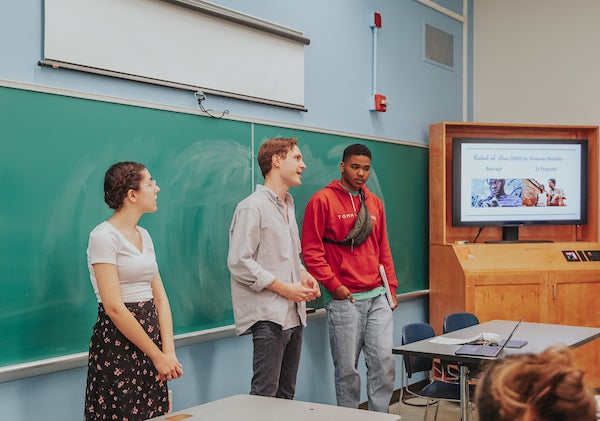
What is critical thinking?
The Oxford English Dictionary defines critical thinking as “The objective, systematic, and rational analysis and evaluation of factual evidence in order to form a judgment on a subject, issue, etc.” Critical thinking involves the use of logic and reasoning to evaluate available facts and/or evidence to come to a conclusion about a certain subject or topic. We use critical thinking every day, from decision-making to problem-solving, in addition to thinking critically in an academic context!
Why is critical thinking important for academic success?
You may be asking “why is critical thinking important for students?” Critical thinking appears in a diverse set of disciplines and impacts students’ learning every day, regardless of major.
Critical thinking skills are often associated with the value of studying the humanities. In majors such as English, students will be presented with a certain text—whether it’s a novel, short story, essay, or even film—and will have to use textual evidence to make an argument and then defend their argument about what they’ve read. However, the importance of critical thinking does not only apply to the humanities. In the social sciences, an economics major , for example, will use what they’ve learned to figure out solutions to issues as varied as land and other natural resource use, to how much people should work, to how to develop human capital through education. Problem-solving and critical thinking go hand in hand. Biology is a popular major within LAS, and graduates of the biology program often pursue careers in the medical sciences. Doctors use critical thinking every day, tapping into the knowledge they acquired from studying the biological sciences to diagnose and treat different diseases and ailments.
Students in the College of LAS take many courses that require critical thinking before they graduate. You may be asked in an Economics class to use statistical data analysis to evaluate the impact on home improvement spending when the Fed increases interest rates (read more about real-world experience with Datathon ). If you’ve ever been asked “How often do you think about the Roman Empire?”, you may find yourself thinking about the Roman Empire more than you thought—maybe in an English course, where you’ll use text from Shakespeare’s Antony and Cleopatra to make an argument about Roman imperial desire. No matter what the context is, critical thinking will be involved in your academic life and can take form in many different ways.
The benefits of critical thinking in everyday life
Building better communication.
One of the most important life skills that students learn as early as elementary school is how to give a presentation. Many classes require students to give presentations, because being well-spoken is a key skill in effective communication. This is where critical thinking benefits come into play: using the skills you’ve learned, you’ll be able to gather the information needed for your presentation, narrow down what information is most relevant, and communicate it in an engaging way.
Typically, the first step in creating a presentation is choosing a topic. For example, your professor might assign a presentation on the Gilded Age and provide a list of figures from the 1870s—1890s to choose from. You’ll use your critical thinking skills to narrow down your choices. You may ask yourself:
- What figure am I most familiar with?
- Who am I most interested in?
- Will I have to do additional research?
After choosing your topic, your professor will usually ask a guiding question to help you form a thesis: an argument that is backed up with evidence. Critical thinking benefits this process by allowing you to focus on the information that is most relevant in support of your argument. By focusing on the strongest evidence, you will communicate your thesis clearly.
Finally, once you’ve finished gathering information, you will begin putting your presentation together. Creating a presentation requires a balance of text and visuals. Graphs and tables are popular visuals in STEM-based projects, but digital images and graphics are effective as well. Critical thinking benefits this process because the right images and visuals create a more dynamic experience for the audience, giving them the opportunity to engage with the material.
Presentation skills go beyond the classroom. Students at the University of Illinois will often participate in summer internships to get professional experience before graduation. Many summer interns are required to present about their experience and what they learned at the end of the internship. Jobs frequently also require employees to create presentations of some kind—whether it’s an advertising pitch to win an account from a potential client, or quarterly reporting, giving a presentation is a life skill that directly relates to critical thinking.
Fostering independence and confidence
An important life skill many people start learning as college students and then finessing once they enter the “adult world” is how to budget. There will be many different expenses to keep track of, including rent, bills, car payments, and groceries, just to name a few! After developing your critical thinking skills, you’ll put them to use to consider your salary and budget your expenses accordingly. Here’s an example:
- You earn a salary of $75,000 a year. Assume all amounts are before taxes.
- 1,800 x 12 = 21,600
- 75,000 – 21,600 = 53,400
- This leaves you with $53,400
- 320 x 12 = 3,840 a year
- 53,400-3,840= 49,560
- 726 x 12 = 8,712
- 49,560 – 8,712= 40,848
- You’re left with $40,848 for miscellaneous expenses. You use your critical thinking skills to decide what to do with your $40,848. You think ahead towards your retirement and decide to put $500 a month into a Roth IRA, leaving $34,848. Since you love coffee, you try to figure out if you can afford a daily coffee run. On average, a cup of coffee will cost you $7. 7 x 365 = $2,555 a year for coffee. 34,848 – 2,555 = 32,293
- You have $32,293 left. You will use your critical thinking skills to figure out how much you would want to put into savings, how much you want to save to treat yourself from time to time, and how much you want to put aside for emergency funds. With the benefits of critical thinking, you will be well-equipped to budget your lifestyle once you enter the working world.
Enhancing decision-making skills
Choosing the right university for you.
One of the biggest decisions you’ll make in your life is what college or university to go to. There are many factors to consider when making this decision, and critical thinking importance will come into play when determining these factors.
Many high school seniors apply to colleges with the hope of being accepted into a certain program, whether it’s biology, psychology, political science, English, or something else entirely. Some students apply with certain schools in mind due to overall rankings. Students also consider the campus a school is set in. While some universities such as the University of Illinois are nestled within college towns, New York University is right in Manhattan, in a big city setting. Some students dream of going to large universities, and other students prefer smaller schools. The diversity of a university’s student body is also a key consideration. For many 17- and 18-year-olds, college is a time to meet peers from diverse racial and socio-economic backgrounds and learn about life experiences different than one’s own.
With all these factors in mind, you’ll use critical thinking to decide which are most important to you—and which school is the right fit for you.
Develop your critical thinking skills at the University of Illinois
At the University of Illinois, not only will you learn how to think critically, but you will put critical thinking into practice. In the College of LAS, you can choose from 70+ majors where you will learn the importance and benefits of critical thinking skills. The College of Liberal Arts & Sciences at U of I offers a wide range of undergraduate and graduate programs in life, physical, and mathematical sciences; humanities; and social and behavioral sciences. No matter which program you choose, you will develop critical thinking skills as you go through your courses in the major of your choice. And in those courses, the first question your professors may ask you is, “What is the goal of critical thinking?” You will be able to respond with confidence that the goal of critical thinking is to help shape people into more informed, more thoughtful members of society.
With such a vast representation of disciplines, an education in the College of LAS will prepare you for a career where you will apply critical thinking skills to real life, both in and outside of the classroom, from your undergraduate experience to your professional career. If you’re interested in becoming a part of a diverse set of students and developing skills for lifelong success, apply to LAS today!
Read more first-hand stories from our amazing students at the LAS Insider blog .
- Privacy Notice
- Accessibility
Thinking and Analysis
Critical thinking skills.

The essence of the independent mind lies not in what it thinks, but in how it thinks. —Christopher Hitchens, author and journalist
Learning Objectives
By the end of this section, you will be able to:
- Define critical thinking
- Describe the role that logic plays in critical thinking
- Describe how critical thinking skills can be used to problem-solve
- Describe how critical thinking skills can be used to evaluate information
- Identify strategies for developing yourself as a critical thinker
Critical Thinking
Thinking comes naturally. You don’t have to make it happen—it just does. But you can make it happen in different ways. For example, you can think positively or negatively. You can think with “heart” and you can think with rational judgment. You can also think strategically and analytically, and mathematically and scientifically. These are a few of multiple ways in which the mind can process thought.
What are some forms of thinking you use? When do you use them, and why?
As a college student, you are tasked with engaging and expanding your thinking skills. One of the most important of these skills is critical thinking. Critical thinking is important because it relates to nearly all tasks, situations, topics, careers, environments, challenges, and opportunities. It’s a “domain-general” thinking skill—not a thinking skill that’s reserved for a one subject alone or restricted to a particular subject area.
Great leaders have highly attuned critical thinking skills, and you can, too. In fact, you probably have a lot of these skills already. Of all your thinking skills, critical thinking may have the greatest value.
What Is Critical Thinking?
Critical thinking is clear, reasonable, reflective thinking focused on deciding what to believe or do. It means asking probing questions like, “How do we know?” or “Is this true in every case or just in this instance?” It involves being skeptical and challenging assumptions, rather than simply memorizing facts or blindly accepting what you hear or read.
Imagine, for example, that you’re reading a history textbook. You wonder who wrote it and why, because you detect certain biases in the writing. You find that the author has a limited scope of research focused only on a particular group within a population. In this case, your critical thinking reveals that there are “other sides to the story.”
Who are critical thinkers, and what characteristics do they have in common? Critical thinkers are usually curious and reflective people. They like to explore and probe new areas and seek knowledge, clarification, and new solutions. They ask pertinent questions, evaluate statements and arguments, and they distinguish between facts and opinion. They are also willing to examine their own beliefs, possessing a manner of humility that allows them to admit lack of knowledge or understanding when needed. They are open to changing their mind. Perhaps most of all, they actively enjoy learning, and seeking new knowledge is a lifelong pursuit.
This may well be you!
No matter where you are on the road to being a critical thinker, you can always more fully develop and finely tune your skills. Doing so will help you develop more balanced arguments, express yourself clearly, read critically, and glean important information efficiently. Critical thinking skills will help you in any profession or any circumstance of life, from science to art to business to teaching. With critical thinking, you become a clearer thinker and problem solver.
The following video, from Lawrence Bland, presents the major concepts and benefits of critical thinking.
Activity: Self-Assess Your Critical Thinking Strategies
- Assess your basic understanding of the skills involved in critical thinking.
- Visit the Quia Critical Thinking Quiz page and click on Start Now (you don’t need to enter your name). Select the best answer for each question, and then click on Submit Answers. A score of 70 percent or better on this quiz is considering passing.
- Based on the content of the questions, do you feel you use good critical thinking strategies in college? In what ways might you improve as a critical thinker?
Critical Thinking and Logic
Critical thinking is fundamentally a process of questioning information and data. You may question the information you read in a textbook, or you may question what a politician or a professor or a classmate says. You can also question a commonly-held belief or a new idea. With critical thinking, anything and everything is subject to question and examination for the purpose of logically constructing reasoned perspectives.
What Is Logic, and Why Is It Important in Critical Thinking?
The word logic comes from the Ancient Greek logike , referring to the science or art of reasoning. Using logic, a person evaluates arguments and reasoning and strives to distinguish between good and bad reasoning, or between truth and falsehood. Using logic, you can evaluate ideas or claims people make, make good decisions, and form sound beliefs about the world. [1]
Questions of Logic in Critical Thinking
Let’s use a simple example of applying logic to a critical-thinking situation. In this hypothetical scenario, a man has a PhD in political science, and he works as a professor at a local college. His wife works at the college, too. They have three young children in the local school system, and their family is well known in the community. The man is now running for political office. Are his credentials and experience sufficient for entering public office? Will he be effective in the political office? Some voters might believe that his personal life and current job, on the surface, suggest he will do well in the position, and they will vote for him. In truth, the characteristics described don’t guarantee that the man will do a good job. The information is somewhat irrelevant. What else might you want to know? How about whether the man had already held a political office and done a good job? In this case, we want to ask, How much information is adequate in order to make a decision based on logic instead of assumptions?
The following questions, presented in Figure 1, below, are ones you may apply to formulating a logical, reasoned perspective in the above scenario or any other situation:
- What’s happening? Gather the basic information and begin to think of questions.
- Why is it important? Ask yourself why it’s significant and whether or not you agree.
- What don’t I see? Is there anything important missing?
- How do I know? Ask yourself where the information came from and how it was constructed.
- Who is saying it? What’s the position of the speaker and what is influencing them?
- What else? What if? What other ideas exist and are there other possibilities?
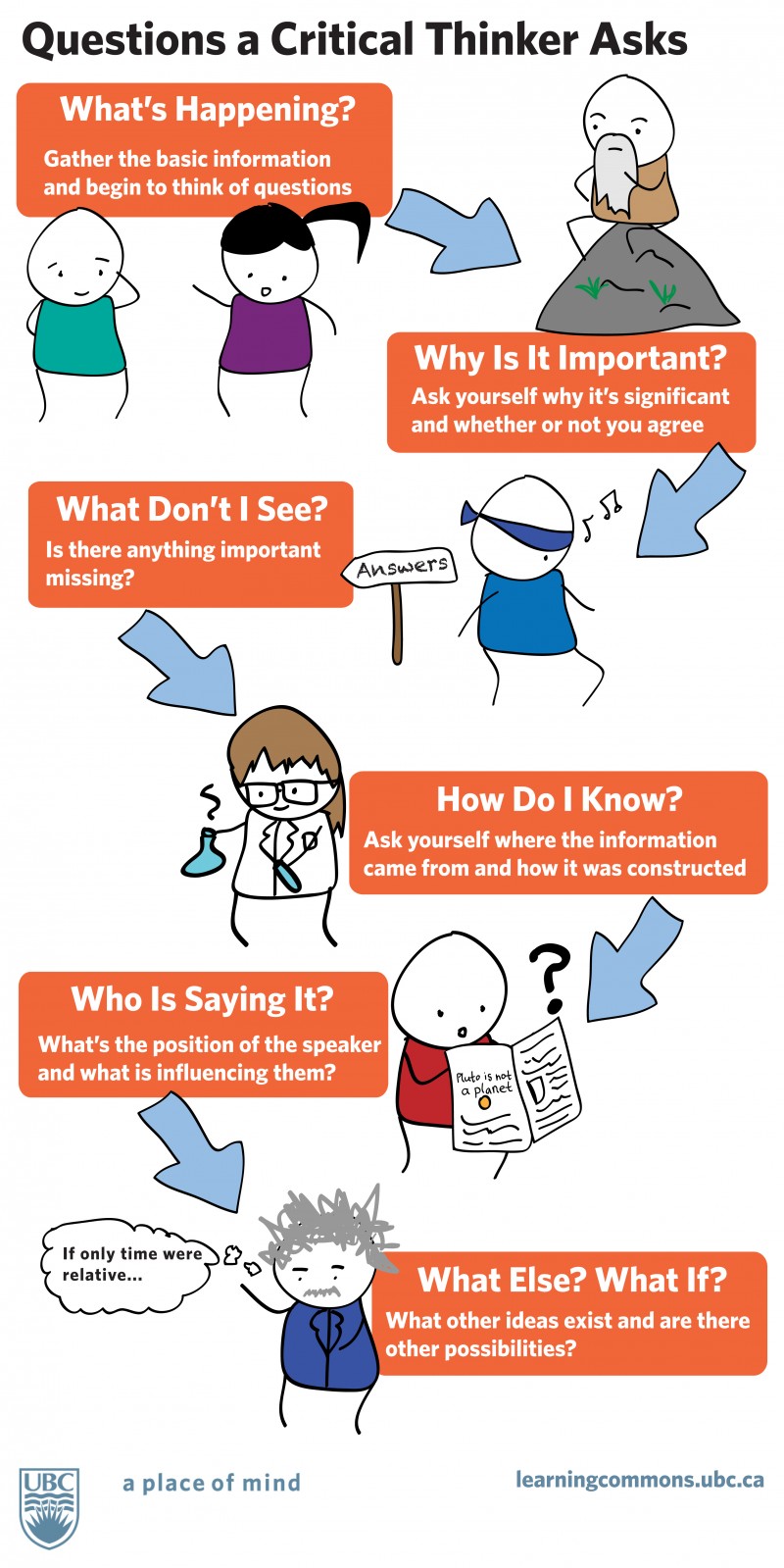
Problem-Solving with Critical Thinking
For most people, a typical day is filled with critical thinking and problem-solving challenges. In fact, critical thinking and problem-solving go hand-in-hand. They both refer to using knowledge, facts, and data to solve problems effectively. But with problem-solving, you are specifically identifying, selecting, and defending your solution. Below are some examples of using critical thinking to problem-solve:
- Your roommate was upset and said some unkind words to you, which put a crimp in the relationship. You try to see through the angry behaviors to determine how you might best support the roommate and help bring the relationship back to a comfortable spot.
- Your campus club has been languishing on account of lack of participation and funds. The new club president, though, is a marketing major and has identified some strategies to interest students in joining and supporting the club. Implementation is forthcoming.
- Your final art class project challenges you to conceptualize form in new ways. On the last day of class when students present their projects, you describe the techniques you used to fulfill the assignment. You explain why and how you selected that approach.
- Your math teacher sees that the class is not quite grasping a concept. She uses clever questioning to dispel anxiety and guide you to new understanding of the concept.
- You have a job interview for a position that you feel you are only partially qualified for, although you really want the job and you are excited about the prospects. You analyze how you will explain your skills and experiences in a way to show that you are a good match for the prospective employer.
- You are doing well in college, and most of your college and living expenses are covered. But there are some gaps between what you want and what you feel you can afford. You analyze your income, savings, and budget to better calculate what you will need to stay in college and maintain your desired level of spending.
Problem-Solving Action Checklist
Problem-solving can be an efficient and rewarding process, especially if you are organized and mindful of critical steps and strategies. Remember, too, to assume the attributes of a good critical thinker. If you are curious, reflective, knowledge-seeking, open to change, probing, organized, and ethical, your challenge or problem will be less of a hurdle, and you’ll be in a good position to find intelligent solutions.
Evaluating Information with Critical Thinking
Evaluating information can be one of the most complex tasks you will be faced with in college. But if you utilize the following four strategies, you will be well on your way to success:
- Read for understanding by using text coding
- Examine arguments
- Clarify thinking
- Cultivate “habits of mind”
Read for Understanding Using Text Coding
When you read and take notes, use the text coding strategy . Text coding is a way of tracking your thinking while reading. It entails marking the text and recording what you are thinking either in the margins or perhaps on Post-it notes. As you make connections and ask questions in response to what you read, you monitor your comprehension and enhance your long-term understanding of the material.
With text coding, mark important arguments and key facts. Indicate where you agree and disagree or have further questions. You don’t necessarily need to read every word, but make sure you understand the concepts or the intentions behind what is written. Feel free to develop your own shorthand style when reading or taking notes. The following are a few options to consider using while coding text.
See more text coding from PBWorks and Collaborative for Teaching and Learning .
Examine Arguments
When you examine arguments or claims that an author, speaker, or other source is making, your goal is to identify and examine the hard facts. You can use the spectrum of authority strategy for this purpose. The spectrum of authority strategy assists you in identifying the “hot” end of an argument—feelings, beliefs, cultural influences, and societal influences—and the “cold” end of an argument—scientific influences. The following video explains this strategy.
Clarify Thinking
When you use critical thinking to evaluate information, you need to clarify your thinking to yourself and likely to others. Doing this well is mainly a process of asking and answering probing questions, such as the logic questions discussed earlier. Design your questions to fit your needs, but be sure to cover adequate ground. What is the purpose? What question are we trying to answer? What point of view is being expressed? What assumptions are we or others making? What are the facts and data we know, and how do we know them? What are the concepts we’re working with? What are the conclusions, and do they make sense? What are the implications?
Cultivate “Habits of Mind”
“Habits of mind” are the personal commitments, values, and standards you have about the principle of good thinking. Consider your intellectual commitments, values, and standards. Do you approach problems with an open mind, a respect for truth, and an inquiring attitude? Some good habits to have when thinking critically are being receptive to having your opinions changed, having respect for others, being independent and not accepting something is true until you’ve had the time to examine the available evidence, being fair-minded, having respect for a reason, having an inquiring mind, not making assumptions, and always, especially, questioning your own conclusions—in other words, developing an intellectual work ethic. Try to work these qualities into your daily life.
Developing Yourself As a Critical Thinker

Critical thinking is a desire to seek, patience to doubt, fondness to meditate, slowness to assert, readiness to consider, carefulness to dispose and set in order; and hatred for every kind of imposture. —Francis Bacon, philosopher
Critical thinking is a fundamental skill for college students, but it should also be a lifelong pursuit. Below are additional strategies to develop yourself as a critical thinker in college and in everyday life:
- Reflect and practice : Always reflect on what you’ve learned. Is it true all the time? How did you arrive at your conclusions?
- Use wasted time : It’s certainly important to make time for relaxing, but if you find you are indulging in too much of a good thing, think about using your time more constructively. Determine when you do your best thinking and try to learn something new during that part of the day.
- Redefine the way you see things : It can be very uninteresting to always think the same way. Challenge yourself to see familiar things in new ways. Put yourself in someone else’s shoes and consider things from a different angle or perspective. If you’re trying to solve a problem, list all your concerns: what you need in order to solve it, who can help, what some possible barriers might be, etc. It’s often possible to reframe a problem as an opportunity. Try to find a solution where there seems to be none.
- Analyze the influences on your thinking and in your life : Why do you think or feel the way you do? Analyze your influences. Think about who in your life influences you. Do you feel or react a certain way because of social convention, or because you believe it is what is expected of you? Try to break out of any molds that may be constricting you.
- Express yourself : Critical thinking also involves being able to express yourself clearly. Most important in expressing yourself clearly is stating one point at a time. You might be inclined to argue every thought, but you might have greater impact if you focus just on your main arguments. This will help others to follow your thinking clearly. For more abstract ideas, assume that your audience may not understand. Provide examples, analogies, or metaphors where you can.
- Enhance your wellness : It’s easier to think critically when you take care of your mental and physical health. Try taking 10-minute activity breaks to reach 30 to 60 minutes of physical activity each day . Try taking a break between classes and walk to the coffee shop that’s farthest away. Scheduling physical activity into your day can help lower stress and increase mental alertness. Also, do your most difficult work when you have the most energy . Think about the time of day you are most effective and have the most energy. Plan to do your most difficult work during these times. And be sure to reach out for help . If you feel you need assistance with your mental or physical health, talk to a counselor or visit a doctor.
Activity: Reflect on Critical Thinking
- Apply critical thinking strategies to your life
Directions:
- Think about someone you consider to be a critical thinker (friend, professor, historical figure, etc). What qualities does he/she have?
- Review some of the critical thinking strategies discussed on this page. Pick one strategy that makes sense to you. How can you apply this critical thinking technique to your academic work?
- Habits of mind are attitudes and beliefs that influence how you approach the world (i.e., inquiring attitude, open mind, respect for truth, etc). What is one habit of mind you would like to actively develop over the next year? How will you develop a daily practice to cultivate this habit?
- Write your responses in journal form, and submit according to your instructor’s guidelines.
The following text is an excerpt from an essay by Dr. Andrew Robert Baker, “Thinking Critically and Creatively.” In these paragraphs, Dr. Baker underscores the importance of critical thinking—the imperative of critical thinking, really—to improving as students, teachers, and researchers. The follow-up portion of this essay appears in the Creative Thinking section of this course.
Thinking Critically and Creatively
Critical thinking skills are perhaps the most fundamental skills involved in making judgments and solving problems. You use them every day, and you can continue improving them.
The ability to think critically about a matter—to analyze a question, situation, or problem down to its most basic parts—is what helps us evaluate the accuracy and truthfulness of statements, claims, and information we read and hear. It is the sharp knife that, when honed, separates fact from fiction, honesty from lies, and the accurate from the misleading. We all use this skill to one degree or another almost every day. For example, we use critical thinking every day as we consider the latest consumer products and why one particular product is the best among its peers. Is it a quality product because a celebrity endorses it? Because a lot of other people may have used it? Because it is made by one company versus another? Or perhaps because it is made in one country or another? These are questions representative of critical thinking.
The academic setting demands more of us in terms of critical thinking than everyday life. It demands that we evaluate information and analyze myriad issues. It is the environment where our critical thinking skills can be the difference between success and failure. In this environment we must consider information in an analytical, critical manner. We must ask questions—What is the source of this information? Is this source an expert one and what makes it so? Are there multiple perspectives to consider on an issue? Do multiple sources agree or disagree on an issue? Does quality research substantiate information or opinion? Do I have any personal biases that may affect my consideration of this information?
It is only through purposeful, frequent, intentional questioning such as this that we can sharpen our critical thinking skills and improve as students, learners and researchers.
—Dr. Andrew Robert Baker, Foundations of Academic Success: Words of Wisdom
Resources for Critical Thinking
- Glossary of Critical Thinking Terms
- Critical Thinking Self-Assessment
- Logical Fallacies Jeopardy Template
- Fallacies Files—Home
- Thinking Critically | Learning Commons
- Foundation for Critical Thinking
- To Analyze Thinking We Must Identify and Question Its Elemental Structures
- Critical Thinking in Everyday Life
- "logike." Wordnik. n.d. Web. 16 Feb 2016. ↵
- "Student Success-Thinking Critically In Class and Online." Critical Thinking Gateway . St Petersburg College, n.d. Web. 16 Feb 2016. ↵
- Critical Thinking Skills. Authored by : Linda Bruce. Provided by : Lumen Learning. License : CC BY: Attribution
- Image of three students. Authored by : PopTech. Located at : https://flic.kr/p/8tXtQp . License : CC BY-SA: Attribution-ShareAlike
- Critical Thinking. Provided by : Critical and Creative Thinking Program. Located at : http://cct.wikispaces.umb.edu/Critical+Thinking . License : CC BY: Attribution
- Thinking Critically. Authored by : UBC Learning Commons. Provided by : The University of British Columbia, Vancouver Campus. Located at : http://www.oercommons.org/courses/learning-toolkit-critical-thinking/view . License : CC BY: Attribution
- Critical Thinking 101: Spectrum of Authority. Authored by : UBC Leap. Located at : https://youtu.be/9G5xooMN2_c . License : CC BY: Attribution
- Image of students putting post-its on wall. Authored by : Hector Alejandro. Located at : https://flic.kr/p/7b2Ax2 . License : CC BY: Attribution
- Foundations of Academic Success. Authored by : Thomas C. Priester, editor. Provided by : Open SUNY Textbooks. Located at : http://textbooks.opensuny.org/foundations-of-academic-success/ . License : CC BY-NC-SA: Attribution-NonCommercial-ShareAlike
- Critical Thinking.wmv. Authored by : Lawrence Bland. Located at : https://youtu.be/WiSklIGUblo . License : All Rights Reserved . License Terms : Standard YouTube License

Critical Thinking in Academic Research - Second Edition
(4 reviews)
Cindy Gruwell, University of West Florida
Robin Ewing, St. Cloud State University
Copyright Year: 2022
Last Update: 2023
Publisher: Minnesota State Colleges and Universities
Language: English
Formats Available
Conditions of use.
Learn more about reviews.
Reviewed by Julie Jaszkowiak, Community Faculty, Metropolitan State University on 12/22/23
Organized in 11 parts, this his textbook includes introductory information about critical thinking and details about the academic research process. The basics of critical thinking related to doing academic research in Parts I and II. Parts III –... read more
Comprehensiveness rating: 5 see less
Organized in 11 parts, this his textbook includes introductory information about critical thinking and details about the academic research process. The basics of critical thinking related to doing academic research in Parts I and II. Parts III – XI provide specifics on various steps in doing academic research including details on finding and citing source material. There is a linked table of contents so the reader is able to jump to a specific section as needed. There is also a works cited page with information and links to works used for this textbook.
Content Accuracy rating: 5
The content of this textbook is accurate and error free. It contains examples that demonstrate concepts from a variety of disciplines such as “hard science” or “popular culture” that assist in eliminating bias. The authors are librarians so it is clear that their experience as such leads to clear and unbiased content.
Relevance/Longevity rating: 5
General concepts about critical thinking and academic research methodology is well defined and should not become obsolete. Specific content regarding use of citation tools and attribution structure may change but the links to various research sites allow for simple updates.
Clarity rating: 5
This textbook is written in a conversational manner that allows for a more personal interaction with the textbook. It is like the reader is having a conversation with a librarian. Each part has an introduction section that fully defines concepts and terms used for that part.
Consistency rating: 5
In addition to the written content, this textbook contains links to short quizzes at the end of each section. This is consistent throughout each part. Embedded links to additional information are included as necessary.
Modularity rating: 4
This textbook is arranged in 11 modular parts with each part having multiple sections. All of these are linked so a reader can go to a distinct part or section to find specific information. There are some links that refer back to previous sections in the document. It can be challenging to return to where you were once you have jumped to a different section.
Organization/Structure/Flow rating: 5
There is clear definition as to what information is contained within each of the parts and subsequent sections. The textbook follows the logical flow of the process of researching and writing a research paper.
Interface rating: 4
The pictures have alternative text that appears when you hover over the text. There is one picture on page 102 that is a link to where the downloaded picture is from. The pictures are clear and supportive of the text for a visual learner. All the links work and go to either the correct area of the textbook or to a valid website. If you are going to use the embedded links to go to other sections of the textbook you need to keep track of where you are as it can sometimes get confusing as to where you went based on clicking links.
Grammatical Errors rating: 4
This is not really a grammatical error but I did notice on some of the quizzes if you misspelled a work for fill in the blank it was incorrect. It was also sometimes challenging to come up with the correct word for the fill in the blanks.
Cultural Relevance rating: 5
There are no examples or text that are culturally insensitive or offensive. The examples are general and would be applicable to a variety of students study many different academic subjects. There are references and information to many research tools from traditional such as checking out books and articles from the library to more current such as blogs and other electronic sources. This information appeals to a wide expanse of student populations.
I really enjoyed the quizzes at the end of each section. It is very beneficial to test your knowledge and comprehension of what you just read. Often I had to return and reread the content more critically based on my quiz results! They are just the right length to not disrupt the overall reading of the textbook and cover the important content and learning objectives.
Reviewed by Sara Stigberg, Adjunct Reference Librarian, Truman College, City Colleges of Chicago on 3/15/23
Critical Thinking in Academic Research thoroughly covers the basics of academic research for undergraduates, including well-guided deeper dives into relevant areas. The authors root their introduction to academic research principles and practices... read more
Critical Thinking in Academic Research thoroughly covers the basics of academic research for undergraduates, including well-guided deeper dives into relevant areas. The authors root their introduction to academic research principles and practices in the Western philosophical tradition, focused on developing students' critical thinking skills and habits around inquiry, rationales, and frameworks for research.
This text conforms to the principles and frames of the Framework for Information Literacy for Higher Education, published by the Association of College and Research Libraries. It includes excellent, clear, step-by-step guides to help students understand rationales and techniques for academic research.
Essential for our current information climate, the authors present relevant information for students who may be new to academic research, in ways and with content that is not too broad or too narrow, or likely to change drastically in the near future.
The authors use clear and well-considered language and explanations of ideas and terms, contextualizing the scholarly research process and tools in a relatable manner. As mentioned earlier, this text includes excellent step-by-step guides, as well as illustrations, visualizations, and videos to instruct students in conducting academic research.
(4.75) The terminology and framework of this text are consistent. Early discussions of critical thinking skills are tied in to content in later chapters, with regard to selecting different types of sources and search tools, as well as rationales for choosing various formats of source references. Consciously making the theme of critical thinking as applied to the stages of academic research more explicit and frequent within the text would further strengthen it, however.
Modularity rating: 5
Chapters are divided in a logical, progressive manner throughout the text. The use of embedded links to further readings and some other relevant sections of the text are an excellent way of providing references and further online information, without overwhelming or side-tracking the reader.
Topics in the text are organized in logical, progressive order, transitioning cleanly from one focus to the next. Each chapter begins with a helpful outline of topics that will be covered within it.
There are no technical issues with the interface for this text. Interactive learning tools such as the many self-checks and short quizzes that are included throughout the text are a great bonus for reinforcing student learning, and the easily-accessible table of contents was very helpful. There are some slight inconsistencies across chapters, however, relative to formatting images and text and spacing, and an image was missing in the section on Narrowing a Topic. Justifying copy rather than aligning-left would prevent hyphenation, making the text more streamlined.
Grammatical Errors rating: 5
(4.75) A few minor punctuation errors are present.
The authors of this text use culturally-relevant examples and inclusive language. The chapter on Barriers to Critical Thinking works directly to break down bias and preconceived notions.
Overall, Critical Thinking in Academic Research is an excellent general textbook for teaching the whys and hows of academic research to undergraduates. A discussion of annotated bibliographies would be a great addition for future editions of the text. ---- (As an aside for the authors, I am curious if the anonymous data from the self-checks and quizzes is being collected and analyzed for assessment purposes. I'm sure it would be interesting!)
Reviewed by Ann Bell-Pfeifer, Program Director/ Instructor, Minnesota State Community and Technical College on 2/15/23
The book has in depth coverage of academic research. A formal glossary and index were not included. read more
Comprehensiveness rating: 4 see less
The book has in depth coverage of academic research. A formal glossary and index were not included.
The book appears error free and factual.
The content is current and would support students who are pursuing writing academic research papers.
Excellent explanations for specific terms were included throughout the text.
The text is easy to follow with a standardized format and structure.
The text contains headings and topics in each section.
It is easy to follow the format and review each section.
Interface rating: 5
The associated links were useful and not distracting.
No evidence of grammatical errors were found in the book.
The book is inclusive.
The book was informative, easy to follow, and sequential allowing the reader to digest each section before moving into another.
Reviewed by Jenny Inker, Assistant Professor, Virginia Commonwealth University on 8/23/22
This book provides a comprehensive yet easily comprehensible introduction to critical thinking in academic research. The author lays a foundation with an introduction to the concepts of critical thinking and analyzing and making arguments, and... read more
This book provides a comprehensive yet easily comprehensible introduction to critical thinking in academic research. The author lays a foundation with an introduction to the concepts of critical thinking and analyzing and making arguments, and then moves into the details of developing research questions and identifying and appropriately using research sources. There are many wonderful links to other open access publications for those who wish to read more or go deeper.
The content of the book appears to be accurate and free of bias.
The examples used throughout the book are relevant and up-to-date, making it easy to see how to apply the concepts in real life.
The text is very accessibly written and the content is presented in a simple, yet powerful way that helps the reader grasp the concepts easily. There are many short, interactive exercises scattered throughout each chapter of the book so that the reader can test their own knowledge as they go along. It would be even better if the author had provided some simple feedback explaining why quiz answers are correct or incorrect in order to bolster learning, but this is a very minor point and the interactive exercises still work well without this.
The book appears consistent throughout with regard to use of terminology and tone of writing. The basic concepts introduced in the early chapters are used consistently throughout the later chapters.
This book has been wonderfully designed into bite sized chunks that do not overwhelm the reader. This is perhaps its best feature, as this encourages the reader to take in a bit of information, digest it, check their understanding of it, and then move on to the next concept. I loved this!
The book is organized in a manner that introduces the basic architecture of critical thinking first, and then moves on to apply it to the subject of academic research. While the entire book would be helpful for college students (undergraduates particularly), the earlier chapters on critical thinking and argumentation also stand well on their own and would be of great utility to students in general.
This book was extremely easy to navigate with a clear, drop down list of chapters and subheadings on the left side of the screen. When the reader clicks on links to additional material, these open up in a new tab which keeps things clear and organized. Images and charts were clear and the overall organization is very easy to follow.
I came across no grammatical errors in the text.
Cultural Relevance rating: 4
This is perhaps an area where the book could do a little more. I did not come across anything that seemed culturally insensitive or offensive but on the other hand, the book might have taken more opportunities to represent a greater diversity of races, ethnicities, and backgrounds.
This book seems tailor made for undergraduate college students and I would highly recommend it. I think it has some use for graduate students as well, although some of the examples are perhaps little basic for this purpose. As well as using this book to guide students on doing academic research, I think it could also be used as a very helpful introduction to the concept of critical thinking by focusing solely on chapters 1-4.

Table of Contents
- Introduction
- Part I. What is Critical Thinking?
- Part II. Barriers to Critical Thinking
- Part III. Analyzing Arguments
- Part IV. Making an Argument
- Part V. Research Questions
- Part VI. Sources and Information Needs
- Part VII. Types of Sources
- Part VIII. Precision Searching
- Part IX. Evaluating Sources
- Part X. Ethical Use and Citing Sources
- Part XI. Copyright Basics
- Works Cited
- About the Authors
Ancillary Material
About the book.
Critical Thinking in Academic Research - 2nd Edition provides examples and easy-to-understand explanations to equip students with the skills to develop research questions, evaluate and choose the right sources, search for information, and understand arguments. This 2nd Edition includes new content based on student feedback as well as additional interactive elements throughout the text.
About the Contributors
Cindy Gruwell is an Assistant Librarian/Coordinator of Scholarly Communication at the University of West Florida. She is the library liaison to the department of biology and the College of Health which has extensive nursing programs, public health, health administration, movement, and medical laboratory sciences. In addition to supporting health sciences faculty, she oversees the Argo IRCommons (Institutional Repository) and provides scholarly communication services to faculty across campus. Cindy graduated with her BA (history) and MLS from the University of California, Los Angeles and has a Masters in Education from Bemidji State University. Cindy’s research interests include academic research support, publishing, and teaching.
Robin Ewing is a Professor/Collections Librarian at St. Cloud State University. Robin is the liaison to the College of Education and Learning Design. She oversees content selection for the Library’s collections. Robin graduated with her BBA (Management) and MLIS from the University of Oklahoma. She also has a Masters of Arts in Teaching from Bemidji State University. Robin’s research interests include collection analysis, assessment, and online teaching.
Contribute to this Page
The Importance of Critical Thinking Skills for Students
Link Copied
Share on Facebook
Share on Twitter
Share on LinkedIn
.jpg)
Brains at Work!
If you’re moving toward the end of your high school career, you’ve likely heard a lot about college life and how different it is from high school. Classes are more intense, professors are stricter, and the curriculum is more complicated. All in all, it’s very different compared to high school.
Different doesn’t have to mean scary, though. If you’re nervous about beginning college and you’re worried about how you’ll learn in a place so different from high school, there are steps you can take to help you thrive in your college career.
If you’re wondering how to get accepted into college and how to succeed as a freshman in such a new environment, the answer is simple: harness the power of critical thinking skills for students.
What is critical thinking?
Critical thinking entails using reasoning and the questioning of assumptions to address problems, assess information, identify biases, and more. It's a skillset crucial for students navigating their academic journey and beyond, including how to get accepted into college . At its crux, critical thinking for students has everything to do with self-discipline and making active decisions to 'think outside the box,' allowing individuals to think beyond a concept alone in order to understand it better.
Critical thinking skills for students is a concept highly encouraged in any and every educational setting, and with good reason. Possessing strong critical thinking skills will make you a better student and, frankly, help you gain valuable life skills. Not only will you be more efficient in gathering knowledge and processing information, but you will also enhance your ability to analyse and comprehend it.
Importance of critical thinking for students
Developing critical thinking skills for students is essential for success at all academic levels, particularly in college. It introduces reflection and perspective while encouraging you to question what you’re learning! Even if you’ve seen solid facts. Asking questions, considering other perspectives, and self-reflection cultivate resilient students with endless potential for learning, retention, and personal growth.A well-developed set of critical thinking skills for students will help them excel in many areas. Here are some critical thinking examples for students:
1. Decision-making
If you’re thinking critically, you’re not making impulse decisions or snap judgments; you’re taking the time to weigh the pros and cons. You’re making informed decisions. Critical thinking skills for students can make all the difference.
2. Problem-solving
Students with critical thinking skills are more effective in problem-solving. This reflective thinking process helps you use your own experiences to ideate innovations, solutions, and decisions.
3. Communication
Strong communication skills are a vital aspect of critical thinking for students, helping with their overall critical thinking abilities. How can you learn without asking questions? Critical thinking for students is what helps them produce the questions they may not have ever thought to ask. As a critical thinker, you’ll get better at expressing your ideas concisely and logically, facilitating thoughtful discussion, and learning from your teachers and peers.
4. Analytical skills
Developing analytical skills is a key component of strong critical thinking skills for students. It goes beyond study tips on reviewing data or learning a concept. It’s about the “Who? What? Where? Why? When? How?” When you’re thinking critically, these questions will come naturally, and you’ll be an expert learner because of it.
How can students develop critical thinking skills
Although critical thinking skills for students is an important and necessary process, it isn’t necessarily difficult to develop these observational skills. All it takes is a conscious effort and a little bit of practice. Here are a few tips to get you started:
1. Never stop asking questions
This is the best way to learn critical thinking skills for students. As stated earlier, ask questions—even if you’re presented with facts to begin with. When you’re examining a problem or learning a concept, ask as many questions as you can. Not only will you be better acquainted with what you’re learning, but it’ll soon become second nature to follow this process in every class you take and help you improve your GPA .
2. Practice active listening
As important as asking questions is, it is equally vital to be a good listener to your peers. It is astounding how much we can learn from each other in a collaborative environment! Diverse perspectives are key to fostering critical thinking skills for students. Keep an open mind and view every discussion as an opportunity to learn.
3. Dive into your creativity
Although a college environment is vastly different from high school classrooms, one thing remains constant through all levels of education: the importance of creativity. Creativity is a guiding factor through all facets of critical thinking skills for students. It fosters collaborative discussion, innovative solutions, and thoughtful analyses.
4. Engage in debates and discussions
Participating in debates and discussions helps you articulate your thoughts clearly and consider opposing viewpoints. It challenges the critical thinking skills of students about the evidence presented, decoding arguments, and constructing logical reasoning. Look for debates and discussion opportunities in class, online forums, or extracurricular activities.
5. Look out for diverse sources of information
In today's digital age, information is easily available from a variety of sources. Make it a habit to explore different opinions, perspectives, and sources of information. This not only broadens one's understanding of a subject but also helps in distinguishing between reliable and biased sources, honing the critical thinking skills of students.
Unlock the power of critical thinking skills while enjoying a seamless student living experience!
Book through amber today!
6. Practice problem-solving
Try engaging in challenging problems, riddles or puzzles that require critical thinking skills for students to solve. Whether it's solving mathematical equations, tackling complex scenarios in literature, or analysing data in science experiments, regular practice of problem-solving tasks sharpens your analytical skills. It enhances your ability to think critically under pressure.
Nurturing critical thinking skills helps students with the tools to navigate the complexities of academia and beyond. By learning active listening, curiosity, creativity, and problem-solving, students can create a sturdy foundation for lifelong learning. By building upon all these skills, you’ll be an expert critical thinker in no time—and you’ll be ready to conquer all that college has to offer!
Frequently Asked Questions
What questions should i ask to be a better critical thinker, how can i sharpen critical thinking skills for students, how do i avoid bias, can i use my critical thinking skills outside of school, will critical thinking skills help students in their future careers.
Your ideal student home & a flight ticket awaits
Follow us on :

Related Posts

Top 20 Tourist Attractions In Nottingham

15 Best Clubs in Glasgow in 2023

15 Best Museums in New York

Planning to Study Abroad ?

Your ideal student accommodation is a few steps away! Please fill in your details below so we can find you a new home!
We have got your response
.jpg)
amber © 2024. All rights reserved.
4.8/5 on Trustpilot
Rated as "Excellent" • 4800+ Reviews by students
Rated as "Excellent" • 4800+ Reviews by Students

Critical Thinking & Why It’s So Important
Critical thinking is a cognitive skill with the power to unlock the full potential of your mind. In today’s rapidly evolving society, where information is abundant but discerning its validity is becoming increasingly challenging, the art of critical thinking has never been more crucial.
At Nichols College, we believe that cultivating strong critical thinking abilities is not just a pursuit for the academically inclined, but a fundamental necessity for individuals across all walks of life. Join us as we explore the significance of critical thinking and the remarkable impact it can have on your decision-making, problem-solving, and overall cognitive prowess.
Discover why our Graduate Certificate program in Advanced Critical Thinking and Decision Making is your gateway to becoming a perceptive and adept thinker, ready to tackle the complex challenges of today’s world with confidence and ingenuity.
What is critical thinking?
Critical thinking is a fundamental skill that allows individuals to analyze, evaluate, and interpret information objectively and rationally. It goes beyond merely accepting information at face value; instead, critical thinkers are equipped to delve deeper, question assumptions, and explore various perspectives before arriving at well-informed conclusions. This ability to think critically is highly valued across various domains, including education, business, and everyday life.
Benefits of using critical thinking
The countless advantages of critical thinking extend far beyond the realms of academia. For starters, critical thinking fosters superior decision-making by equipping individuals with the tools to weigh options, assess consequences, and arrive at better choices. Critical thinkers also benefit from heightened self-reflection, gaining a profound understanding of their own biases and areas for improvement.
Critical thinkers become well-informed individuals who can navigate the sea of information with discernment, adeptly identifying misinformation and unreliable sources. Furthermore, this invaluable skill enables creative problem-solving, allowing thinkers to craft innovative solutions to intricate challenges. Some of the most important benefits of using critical thinking include:
Better decision making
Critical thinkers excel at weighing pros and cons, considering alternatives, and anticipating potential consequences. This leads to more informed and effective decision-making processes, both in personal and professional realms.
Better self-reflection
By fostering a habit of introspection, critical thinkers become more self-aware, recognizing their own biases and limitations. This heightened self-awareness allows them to continually improve and adapt their thinking patterns.
Being well-informed
Critical thinkers actively seek out diverse sources of information, ensuring they have a comprehensive understanding of complex issues. This empowers them to engage in meaningful discussions and contribute constructively to their communities.
The ability to identify misinformation
In a world filled with misinformation, critical thinkers possess the skills to discern fact from fiction. They scrutinize sources, verify information, and avoid being misled by deceptive content.
Building creative problem solving skills
Critical thinking encourages innovative and outside-the-box problem-solving approaches. By considering multiple angles and challenging conventional ideas, critical thinkers arrive at inventive solutions to complex challenges.
What skills do critical thinkers have?
Critical thinkers possess a remarkable set of skills that elevate their cognitive abilities and enable them to approach complex issues with acuity. Embracing these skills empowers them to tackle challenges, unravel complexities, and make meaningful insights and well-informed decisions. Some of the most valuable skills critical thinkers have include:
Critical thinkers have a natural inclination to ask questions and explore topics in-depth. Their thirst for knowledge drives them to seek out answers and continually expand their understanding.
Proficient in conducting thorough research, critical thinkers gather information from reliable sources and assess its validity. They are skilled at distinguishing credible data from biased or unsubstantiated claims.
Pattern recognition
Critical thinkers recognize recurring patterns and connections between seemingly unrelated pieces of information. This allows them to draw meaningful insights and make well-founded predictions.
Bias identification
Having honed the ability to identify biases, critical thinkers remain open-minded and impartial in their assessments. They acknowledge their own biases and strive to approach each situation objectively.
How to use critical thinking skills in the workplace
In any work environment, critical thinking is a valuable asset that can enhance productivity and foster a more innovative and collaborative workplace. Employees with strong critical thinking skills contribute to problem-solving sessions, provide constructive feedback, and make informed decisions based on thorough analysis. By promoting critical thinking, organizations encourage employees to challenge assumptions, seek out novel solutions, and contribute to the overall growth and success of the company.
Examples of good critical thinking in action
The real-world application of critical thinking can be awe-inspiring, as it empowers individuals to approach various scenarios with astute judgment and creativity. In the business realm and with regard to project management, critical thinkers demonstrate their prowess by:
- Analyzing Market Trends : A marketing professional employs critical thinking skills to assess market trends, consumer behavior, and competitor strategies before devising a successful marketing campaign that aligns with the target audience’s needs.
- Problem-Solving in Project Management : A project manager utilizes critical thinking to identify potential roadblocks, consider alternative approaches, and ensure projects are executed efficiently and within budget.
Furthermore, critical thinkers shine in scientific research, meticulously evaluating data, and drawing evidence-based conclusions that contribute to groundbreaking discoveries. In everyday life, they navigate the digital landscape with discernment, identifying misinformation and making informed decisions about their health, finances, and general well-being. These examples illustrate the power of critical thinking to transform not only individual lives but also entire industries, making it an indispensable skill in the pursuit of success and progress.
Get a critical thinking graduate certificate from Nichols College
If you are eager to enhance your problem-solving abilities, decision-making processes, and overall cognitive skills, the Nichols College graduate certificate in critical thinking may be right for you. Designed to equip individuals with the necessary tools to excel in today’s complex world, this program will empower you to think critically, analyze data effectively, and approach challenges with creativity and confidence. Elevate your potential and join Nichols College in cultivating a new generation of sharp-minded leaders, ready to make a positive impact on the world. Enroll in the Advanced Critical Thinking and Decision Making certificate program today and unlock a brighter future for yourself and your community.
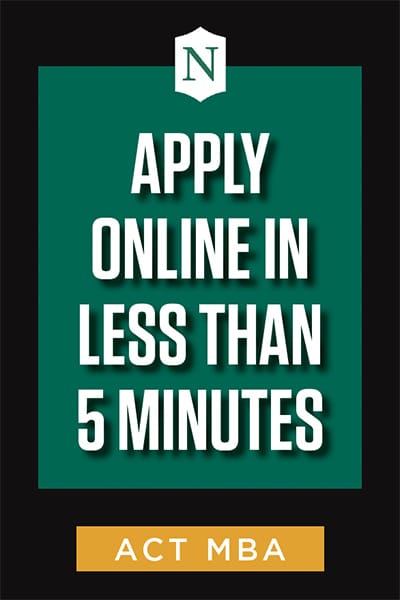
- Master of Science in Counterterrorism
- Critical Thinking Certificate
- Career Paths
- Financial Aid
- Request Information
Developing Critical Thinking
- Posted January 10, 2018
- By Iman Rastegari
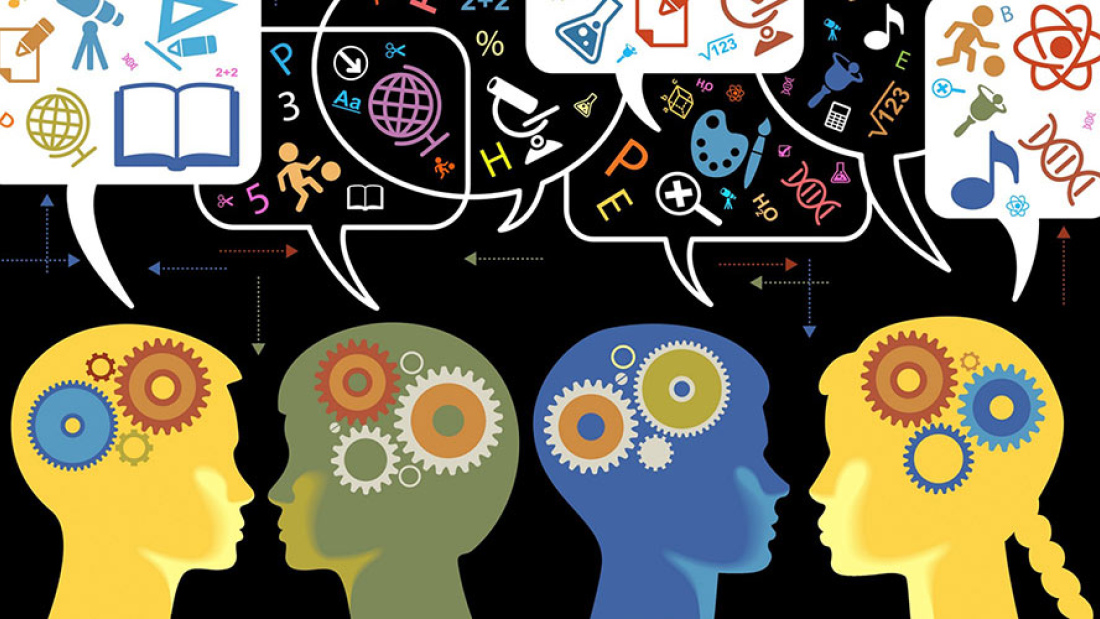
In a time where deliberately false information is continually introduced into public discourse, and quickly spread through social media shares and likes, it is more important than ever for young people to develop their critical thinking. That skill, says Georgetown professor William T. Gormley, consists of three elements: a capacity to spot weakness in other arguments, a passion for good evidence, and a capacity to reflect on your own views and values with an eye to possibly change them. But are educators making the development of these skills a priority?
"Some teachers embrace critical thinking pedagogy with enthusiasm and they make it a high priority in their classrooms; other teachers do not," says Gormley, author of the recent Harvard Education Press release The Critical Advantage: Developing Critical Thinking Skills in School . "So if you are to assess the extent of critical-thinking instruction in U.S. classrooms, you’d find some very wide variations." Which is unfortunate, he says, since developing critical-thinking skills is vital not only to students' readiness for college and career, but to their civic readiness, as well.
"It's important to recognize that critical thinking is not just something that takes place in the classroom or in the workplace, it's something that takes place — and should take place — in our daily lives," says Gormley.
In this edition of the Harvard EdCast, Gormley looks at the value of teaching critical thinking, and explores how it can be an important solution to some of the problems that we face, including "fake news."
About the Harvard EdCast
The Harvard EdCast is a weekly series of podcasts, available on the Harvard University iT unes U page, that features a 15-20 minute conversation with thought leaders in the field of education from across the country and around the world. Hosted by Matt Weber and co-produced by Jill Anderson, the Harvard EdCast is a space for educational discourse and openness, focusing on the myriad issues and current events related to the field.

An education podcast that keeps the focus simple: what makes a difference for learners, educators, parents, and communities
Related Articles

Roots of the School Gardening Movement
Student-centered learning, reading and the common core.
Academic Writing: Critical Thinking & Writing
- Academic Writing
- Planning your writing
- Structuring your assignment
- Critical Thinking & Writing
- Building an argument
- Reflective Writing
- Summarising, paraphrasing and quoting
Critical Thinking
One of the most important features of studying at university is the expectation that you will engage in thinking critically about your subject area.
Critical thinking involves asking meaningful questions concerning the information, ideas, beliefs, and arguments that you will encounter. It requires you to approach your studies with a curious, open mind, discard preconceptions, and interrogate received knowledge and established practices.
Critical thinking is key to successfully expressing your individuality as an independent learner and thinker in an academic context. It is also a valuable life skill.
Critical thinking enables you to:
- Evaluate information, its validity and significance in a particular context.
- Analyse and interpret evidence and data in response to a line of enquiry.
- Weigh-up alternative explanations and arguments.
- Develop your own evidence-based and well-reasoned arguments.
- Develop well-informed viewpoints.
- Formulate your own independent, justifiable ideas.
- Actively engage with the wider scholarship of your academic community.
Writing Critically
Being able to demonstrate and communicate critical thinking in your written assignments through critical writing is key to achieving academic success.
Critical writing can be distinguished from descriptive writing which is concerned with conveying information rather than interrogating information. Understanding the difference between these two styles of academic writing and when to use them is important.
The balance between descriptive writing and critical writing will vary depending on the nature of the assignment and the level of your studies. Some level of descriptive writing is generally necessary to support critical writing. More sophisticated criticality is generally required at higher levels of study with less descriptive content. You will continue to develop your critical writing skills as you progress through your course.
Descriptive Writing and Critical Writing
- Descriptive Writing
- Critical Writing
- Examples of Critical Writing
Descriptive writing demonstrates the knowledge you have of a subject, and your knowledge of what other people say about that subject. Descriptive writing often responds to questions framed as ‘what’ , ‘where’ , ‘who’ and ‘when’ .
Descriptive writing might include the following:
- Description of what something is or what it is about (an account, facts, observable features, details): a topic, problem, situation, or context of the subject under discussion.
- Description of where it takes place (setting and context), who is involved and when it occurs.
- Re-statement or summary of what others say about the topic.
- Background facts and information for a discussion.
Description usually comes before critical content so that the reader can understand the topic you are critically engaging with.
Critical writing requires you to apply interpretation, analysis, and evaluation to the descriptions you have provided. Critical writing often responds to questions framed as ‘how’ or ‘why’ . Often, critical writing will require you to build an argument which is supported by evidence.
Some indicators of critical writing are:
- Investigation of positive and negative perspectives on ideas
- Supporting ideas and arguments with evidence, which might include authoritative sources, data, statistics, research, theories, and quotations
- Balanced, unbiased appraisal of arguments and counterarguments/alternative viewpoints
- Honest recognition of the limitations of an argument and supporting evidence
- Plausible, rational, convincing, and well-reasoned conclusions
Critical writing might include the following:
- Applying an idea or theory to different situations or relate theory to practice. Does the idea work/not work in practice? Is there a factor that makes it work/not work? For example: 'Smith's (2008) theory on teamwork is effective in the workplace because it allows a diverse group of people with different skills to work effectively'.
- Justifying why a process or policy exists. For example: 'It was necessary for the nurse to check the patient's handover notes because...'
- Proposing an alternative approach to view and act on situations. For example: 'By adopting a Freirian approach, we could view the student as a collaborator in our teaching and learning'. Or: 'If we had followed the NMC guidelines we could have made the patient feel calm and relaxed during the consultation'.
- Discussion of the strengths and weaknesses of an idea/theory/policy. Why does this idea/theory/policy work? Or why does this idea not work? For example: 'Although Smith's (2008) theory on teamwork is useful for large teams, there are challenges in applying this theory to teams who work remotely'.
- Discussion of how the idea links to other ideas in the field (synthesis). For example: 'the user experience of parks can be greatly enhanced by examining Donnelly's (2009) customer service model used in retail’.
- Discussion of how the idea compares and contrasts with other ideas/theories. For example: ‘The approach advocated by the NMC differs in comparison because of factor A and factor C’.
- Discussion of the ‘’up-to-datedness” and relevance of an idea/theory/policy (its currency). For example: 'although this approach was successful in supporting the local community, Smith's model does not accommodate the needs of a modern global economy'.
- Evaluating an idea/theory/policy by providing evidence-informed judgment. For example: 'Therefore, May's delivery model should be discontinued as it has created significant issues for both customers and staff (Ransom, 2018)'.
- Creating new perspectives or arguments based on knowledge. For example: 'to create strong and efficient buildings, we will look to the designs provided by nature. The designs of the Sydney Opera House are based on the segments of an orange (Cook, 2019)'.
Further Reading
- << Previous: Structuring your assignment
- Next: Building an argument >>
- Last Updated: Apr 12, 2024 3:27 PM
- URL: https://libguides.uos.ac.uk/academic-writing
➔ About the Library
➔ Meet the Team
➔ Customer Service Charter
➔ Library Policies & Regulations
➔ Privacy & Data Protection
Essential Links
➔ A-Z of eResources
➔ Frequently Asked Questions
➔Discover the Library
➔Referencing Help
➔ Print & Copy Services
➔ Service Updates
Library & Learning Services, University of Suffolk, Library Building, Long Street, Ipswich, IP4 1QJ
✉ Email Us: [email protected]
✆ Call Us: +44 (0)1473 3 38700
- The Open University
- Guest user / Sign out
- Study with The Open University
My OpenLearn Profile
Personalise your OpenLearn profile, save your favourite content and get recognition for your learning
About this free course
Become an ou student, download this course, share this free course.

Start this free course now. Just create an account and sign in. Enrol and complete the course for a free statement of participation or digital badge if available.
4 The importance of critical thinking and analysis in academic studies
The aim of critical thinking is to try to maintain an objective position. When you think critically, you weigh up all sides of an argument and evaluate its strengths and weaknesses. So, critical thinking entails: actively seeking all sides of an argument, testing the soundness of the claims made, as well as testing the soundness of the evidence used to support the claims.
Box 1 What ‘being critical’ means in the context of critical thinking
Critical thinking is not :
- restating a claim that has been made
- describing an event
- challenging peoples’ worth as you engage with their work
- criticising someone or what they do (which is made from a personal, judgemental position).
Critical thinking and analysis are vital aspects of your academic life – when reading, when writing and working with other students.
While critical analysis requires you to examine ideas, evaluate them against what you already know and make decisions about their merit, critical reflection requires you to synthesise different perspectives (whether from other people or literature) to help explain, justify or challenge what you have encountered in your own or other people’s practice. It may be that theory or literature gives us an alternative perspective that we should consider; it may provide evidence to support our views or practices, or it may explicitly challenge them.
You will encounter a number of activities and assignments in your postgraduate studies that frequently demand interpretation and synthesis skills. We introduced such an activity in Session 1 (Activity 3). Part of this requires use of ‘higher-order thinking skills’, which are the skills used to analyse and manipulate information (rather than just memorise it). In the 1950s, Benjamin Bloom identified a set of important study and thinking skills for university students, which he called the ‘thinking triangle’ (Bloom, 1956) (Figure 1). Bloom’s taxonomy can provide a useful way of conceptualising higher-order thinking and learning. The six intellectual domains, their descriptions and associated keywords are outlined in Table 1.
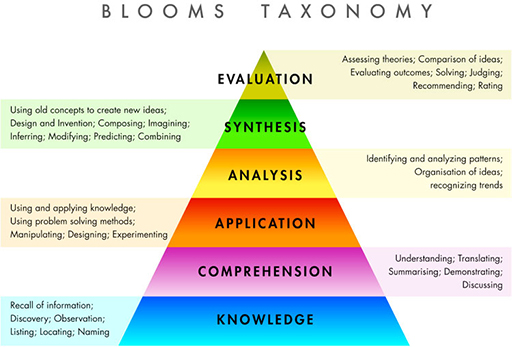
This figure shows a pyramid with the following words, from top to bottom: evaluation (assessing theories; comparison of ideas; evaluating outcomes; solving; judging; recommending; rating), synthesis (using old concepts to create new ideas; design and invention; composing; imagining; inferring; modifying; predicting; combining), analysis (identifying and analysing patterns; organisation of ideas; recognising trends), application (using and applying knowledge; using problem solving methods; manipulating; designing; experimenting), comprehension (understanding; translating; summarising; demonstrating; discussing), knowledge (recall of information; discovery; observation; listing; locating; naming).
What is critical thinking? And do universities really teach it?
Principal Fellow/Associate Professor in Higher Education, The University of Melbourne
Disclosure statement
Martin Davies does not work for, consult, own shares in or receive funding from any company or organisation that would benefit from this article, and has disclosed no relevant affiliations beyond their academic appointment.
University of Melbourne provides funding as a founding partner of The Conversation AU.
View all partners
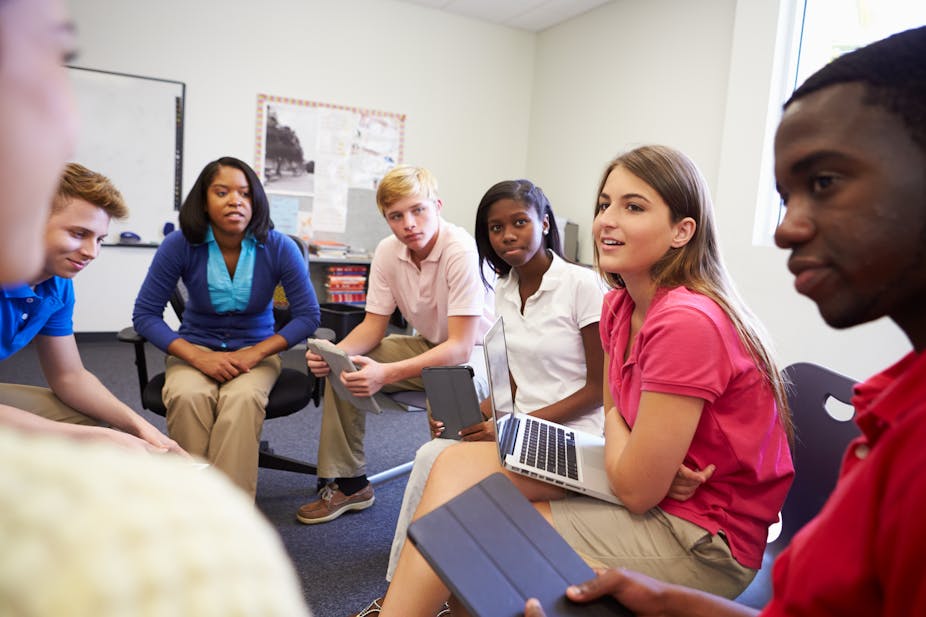
There has been a spate of articles and reports recently about the increasing importance of critical thinking skills for future employment.
A 2015 report by the Foundation for Young Australians claims demand for critical thinking skills in new graduates has risen 158% in three years. This data was drawn from an analysis of 4.2 million online job postings from 6,000 different sources in the period 2012-2015.
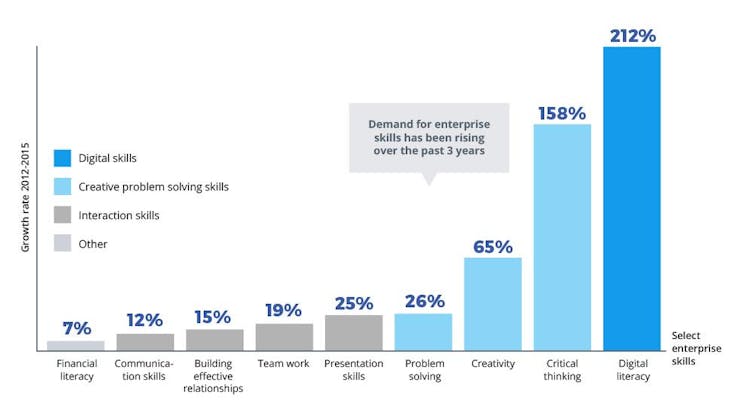
The report found employers can pay a premium for many enterprise skills. For example, evidence of problem solving and critical thinking skills resulted in a higher mean salary of A$7,745. This was a little more than for those with skills in financial literacy ($5,224) and creativity ($3,129). However, presentation ($8,853) and digital literacy ($8,648) skills appeared to be the most desired – or rewarded.
Being a good critical thinker is a desirable trait for getting a job in today’s economy. Why wouldn’t it be? What business or enterprise does not want a good critical thinker?
An old refrain
Actually, none of this is really new – although the pace might have quickened of late. Employers have long been insisting on the importance of critical thinking skills.
In 2006, a major report by a consortium of more than 400 US employers ranked “critical thinking” as the most desirable skill in new employees.
It was ranked higher than skills in “innovation” and “application of information technology”. Surprisingly, 92.1% regarded critical thinking as important, but 69.6% of employers regarded higher school entrants to university “deficient” in this essential skill.
Employers increasingly recognise what is needed in graduates is not so much technical knowledge, but applied skills, especially skills in critical thinking .
These skills are also said to be important within companies themselves as drivers of employee comprehension and decision making.
What is critical thinking, anyway?
But what is critical thinking? If we do not have a clear idea of what it is, we can’t teach it.
It is hard to define things like critical thinking: the concept is far too abstract.
Some have claimed that critical thinking is not a skill as much as an attitude, a “critical spirit” — whatever that might mean (of course it could be both).
Others have suggested that it comprises skills in argumentation, logic, and an awareness of psychology (cognitive biases).
But this does not help get a crisp and clear understanding.
Over the years theorists have tried to nail down a definition of critical thinking. These include:
“… reflective and reasonable thinking that is focused on deciding what to believe or do.” “…the ability to analyse facts , generate and organise ideas, defend opinions, make comparisons, draw inferences, evaluate arguments and solve problems.” “…an awareness of a set of interrelated critical questions , plus the ability and willingness to ask and answer them at appropriate times.” “… thinking about your thinking while you’re thinking to make your thinking better.”
Whatever definition one plumps for, the next question that arises is what are universities doing about teaching it?
A ‘graduate attribute’
Universities claim that they impart critical thinking to students as a “graduate attribute”.
Look at any carefully-prepared institutional list of hoped-for graduate attributes. “Critical thinking” — or its synonyms “analytical thinking”, “critical inquiry” etc — will be there. (Some examples: here , here and here .)
Universities like to think that students exit their institutions thinking much more critically compared to when they went in.
However, what is the evidence for this assumption? Has any university pre-tested for critical thinking skills at admission, and post-tested upon completion of degree to assess gains? Not that I know of.
There are well-validated tests of critical thinking that could be used for such a purpose, the California Critical Thinking Assessment Test being the most used. Others include the Watson Glaser Critical Thinking Appraisal and the Cornell Critical Thinking Tests .
Why hasn’t this been done? I suspect because universities would be justifiably worried about what the results might indicate.
In the margin — and tangentially — some (pessimistic) academics have countered that universities promote precisely the opposite of critical thinking; a culture of uncritical left-wing orthodoxy, an orthodoxy that takes the form of cultural attitude or milieu within the sector and which largely goes unchallenged .
To counter these trends, a group of politically diverse scholars have set up a Heterodox Academy . They agitate for the importance of teaching students how – not what – to think.
How do you teach it?
There is some justification in the claim that universities do not teach critical thinking, despite their oft-cited claims that they do.
In the US media recently, there was a heightened concern about the teaching of critical thinking in universities.
This was sparked by a recent large-scale study – and later a book – using Collegiate Learning Assessment data in the US.
The book provoked widespread interest and media attention in the US, especially on the topic of universities’ failure to teach critical thinking .
It placed serious doubt on the assumption that critical thinking was being adequately taught on American college campuses. It created a storm of discussion in the popular media .
And there is no shortage of studies demonstrating that “very few college courses actually improve these skills”.
Definition unimportant?
How, then, to define critical thinking? It is certainly not an easy question to answer. But perhaps a definition of it is, in the end, unimportant. The important thing is that it does need to be taught, and we need to ensure graduates emerge from university being good at it.
One thing is certain: beyond vague pronouncements and including “critical thinking” among nebulous lists of unmet or hoped-for graduate attributes, universities should be paying more attention to critical thinking and doing a lot more to cultivate it.
- Universities
- Critical thinking

Events and Communications Coordinator

Assistant Editor - 1 year cadetship

Executive Dean, Faculty of Health

Lecturer/Senior Lecturer, Earth System Science (School of Science)

Sydney Horizon Educators (Identified)
- Skip to primary navigation
- Skip to main content
- Skip to primary sidebar
- Skip to footer

Global Cognition
Critical thinking in everyday life.
by Winston Sieck updated September 19, 2021

Have you ever been listening to one of your teacher’s lessons and thought that it had no relevance to your own life?
You’re not alone. Just about every student has felt the same way.
Sure, you use critical thinking skills in the classroom to solve word problems in math, write essays in English, and create hypotheses in science.
But how will you use critical thinking in everyday life?
First, keep in mind that critical thinking is simply a “deliberate thought process.”
Basically, it means that you are using reason and logic to come to a conclusion about an issue or decision you are tangling with.
And clear, sound reasoning is something that will help you every day.
To help you make the leap from classroom to real world, here are 3 concrete examples of critical thinking in everyday life.
Fake News vs. Real News
Take a moment to reflect on your media skills. Do you think you have what it takes to sort out a real news source from a piece of clever advertising?
According to a recent study from Stanford University, a whopping 82% of the teens surveyed could not distinguish between an ad labeled “sponsored content” and a legitimate news story.
Part of the problem may come from schools cutting back on formal instruction of critical thinking skills and an assumption that today’s “digital native” teens can automatically tell the difference without practice or instruction.
You are good at lots of things. But, you know, you’ve practiced those things you’re good at. So, how can you practice telling fact from fiction?
One way (outside of school) is to chat with your family and friends about media sources. Find out how they stay informed, and why they choose those outlets. Ask each other routine questions for evaluating sources .
Do your Friends Know Everything?
It’s tempting to believe that the world begins and ends with your friends. Don’t get me wrong. Friends are definitely important. However, it pays to reflect a little on how a group influences our lives.
To practice critical thinking in everyday life, take a close look at your group of friends. Are there things that are “forbidden” in your social circle? Are you expected to act a certain way, dress a certain way?
Think a certain way?
It’s natural that when a group defines something as “cool”, all the people in the group work to fit into that definition. Regardless of what they individually believe.
The problem is that virtually every situation can be defined in multiple ways. What is “dumb” to one person may be “cool” to another.
Develop your ability to redefine the way you see the world around you. On your own terms.
Find a time when your friend group sees the negative in a situation. Is there a positive way to view it instead? Or at least a way that makes it seem not quite so bad?
You may not be ready to speak up with your independent view. And that’s ok. Just practice thinking differently from the group to strengthen your mind.
Critical Thinking in the Driver’s Seat
One of the core critical thinking skills you need every day is the ability to examine the implications and consequences of a belief or action. In its deepest form, this ability can help you form your own set of beliefs in everything from climate change to religion.
But this skill can also save your life (and your car insurance rate) behind the wheel.
Imagine you are cruising down the freeway when your phone alerts you to an incoming text message. The ability to examine your potential actions and their accompanying consequences will help you make the best choice for how to handle the situation.
Do you look at the text and risk getting into an accident? Do you wait and risk not responding to an urgent matter? Or do you pull over to look at the text and risk being late for your appointment?
The same skill can be applied when you are looking for a place to park, when to pull onto a busy street, or whether to run the yellow light.
Better yet, the more practiced you are at looking at the implications of your driving habits, the faster you can make split second decisions behind the wheel.
Why Critical Thinking in Everyday Life Matters
Literally everyone can benefit from critical thinking because the need for it is all around us.
In a philosophical paper , Peter Facione makes a strong case that critical thinking skills are needed by everyone, in all societies who value safety, justice, and a host of other positive values:
“Considered as a form of thoughtful judgment or reflective decision-making, in a very real sense critical thinking is pervasive. There is hardly a time or a place where it would not seem to be of potential value. As long as people have purposes in mind and wish to judge how to accomplish them, as long as people wonder what is true and what is not, what to believe and what to reject, strong critical thinking is going to be necessary.”
So, in other words, as long as you remain curious, purposeful, and ambitious, no matter what your interests, you’re going to need critical thinking to really own your life.
About Winston Sieck
Dr. Winston Sieck is a cognitive psychologist working to advance the development of thinking skills. He is founder and president of Global Cognition, and director of Thinker Academy .
Reader Interactions
July 27, 2019 at 7:20 am
Wonderful article.. Useful in daily life… I have never imagined the way critical thinking is useful to make judgments
December 9, 2020 at 9:38 pm
My name is Anthony Lambert I am student at miller Motte. Critical Thinking is one my classes. I thank you for giving me the skills of critical thinking.
- Save Your Ammo
- Publications
GC Blog Topics
- Culture & Communication
- Thinking & Deciding
- Learning Skills
- Learning Science
Online Courses
- Thinker Academy
- Study Skills Course
- For Parents
- For Teachers
The Importance of Critical Thinking For A Student 2024

What is the significance of critical thinking? Critical thinking is at the core of learning because it allows students to reflect on and comprehend their perspectives. Based on personal reflection and understanding, this skill assists a student in determining how to understand the world around them.
What Is Critical Thinking?
Many assume that being critical means being typical, a negative approach to thinking about it. To lay it off, individuals can analyse their thinking and present evidence for their ideas instead of accepting personal opinions as substantial proof. When students develop critical thinking skills, they gain various benefits, including improved learning abilities and compassion for the perspectives of others. A person with strong critical thinking will challenge the given information, dismiss any untrustworthy or unscientific logic, and scrutinise the information's sources. They are knowledgeable and can assess the value of discussion and deduce careful but evidence-based conclusions. It is precious for students because it allows them to write essays and assignments without social or personal prejudice.
How Critical Thinking Skills Help Students in Their Careers and Personal Life?
Below is a list of ways critical thinking helps students in their careers and personal life. This list will show the importance of critical thinking for students.
Key To Career Success
Numerous career paths require critical thinking. Not only scientists but also litigators, doctors, media professionals, engineers, accounting professionals, and analysts (to name a few) must use critical thinking in their jobs. Indeed, critical thinking is among the most relevant skills to possess in the workforce, as stated by the World Economic Forum. Because it helps analyse data, think out of the box, resolve issues with creative solutions, and plan methodically.
Enhances Creativity & Curiosity
Critical thinkers are always curious about everything in life and possess diverse interests.
Critical thinking entails continuously asking questions and wanting to learn more about why, who, what, when, and where, as well as everything else that can assist them in making sense of a circumstance or notion. They will never accept anything at face value. They are incredibly creative thinkers who see themselves as having endless potential.
Critical thinkers are always looking for ways to improve, which is essential in the workplace.
Enhances Research Skills
Critical thinking will help you improve your research abilities by observing, analysing, synthesising, and conducting detailed experiments with every element for effective results.
Elevates Autonomous Learning
If we think deeply, we believe more independently because we trust ourselves more. Critical thinking is essential for empowering learners to make choices and develop views.
Be a Good Communicator
While you may believe being a critical thinker will cause relationship problems, this could not be further from the truth! Being a critical thinker can assist you in better comprehending the perspectives of others and becoming more open-minded to different points of view. You learn how to communicate your feelings.
Solve Problems
Problem-solving is a basic reflex for those with the ability to think critically. Critical thinkers are attentive and dedicated to solving problems. As Albert Einstein stated, "It's not that I'm so intelligent; it's just that I stay with issues longer." Critical thinkers' advanced problem-solving abilities enable them to excel at their jobs and fix the world's most challenging problems. They can transform the world for the better.
Make Sense of Information
Being a critical thinker means dealing with data more seriously than the rest. Hence you would learn how to evaluate information. It will help you separate the crucial information from the redundant ones.
Make Decisions
There's no denying that critical thinkers make the best decisions. Critical thinking helps us cope with daily issues, and this method is often achieved subconsciously.
It teaches us to think for ourselves and to trust our instincts. This will further help you in your career and life in general.
Helps in Analysing Arguments
Analysing arguments is not an easy skill to hone. But when you think critically, you are open-minded. You see things from more than one perspective, which helps you to analyse the argument better than the rest.
Make Students Ask the Right Questions
Another excellent way to improve critical thinking is to pose as many questions as possible; this will necessitate the student to be curious about various topics. When a person develops the practice of asking questions, it improves their knowledge of the subject and eliminates any doubts they may have had. This also enhances the student's ability to analyse situations. Thinking critically will improve dramatically as each topic is examined from various angles.
Students Learn to Think Out-of-the-Box
Once you start thinking critically, you will have a wide set of ideas. You will be forced to think out of the box in challenging situations, which will also help you think faster.
Importance of Critical Thinking
1. Enhanced Decision Making : Critical thinking enables individuals to evaluate all available information and make well-informed decisions rather than making choices based on emotion or limited data.
2. Problem Solving : It aids in approaching problems methodically and logically, allowing for the development of viable solutions based on thorough evaluation.
3. Independence of Thought : Critical thinkers are less reliant on others to tell them what to believe, as they possess the skills to evaluate information on their own.
4. Discernment of Information : In our age of information overload, it's vital to distinguish between credible sources and misinformation or biases.
5. Improved Communication : Critical thinkers can clearly articulate their thoughts, understanding, and the reasons behind their beliefs, leading to more productive discussions and debates.
6. Broadened Perspective : It encourages open-mindedness and the ability to view issues and scenarios from multiple angles and perspectives.
7. Academic Success : Critical thinking is crucial for understanding complex concepts, evaluating arguments, and weaving together information from various sources.
8. Personal Growth : It helps in self-reflection, aiding individuals in understanding their beliefs, values, and actions better.
9. Adaptability : Critical thinkers are better equipped to adapt to changing environments or circumstances, as they can evaluate new information and understand its implications.
10. Ethical Considerations : Critical thinking often involves considering the ethical implications of decisions, leading to more morally sound choices.
11. Prevention of Problems : By anticipating potential challenges and assessing various solutions, critical thinkers can prevent certain issues from arising.
12. Enhanced Creativity : While critical thinking and creativity might seem opposed, the former can actually enhance the latter by encouraging a deeper understanding of problems, which can lead to innovative solutions.
Why is critical thinking important for students?
Critical thinking is paramount for students because it equips them with the ability to independently analyse, evaluate, and form logical conclusions from the vast information they encounter. In our rapidly changing and information-saturated world, students are often bombarded with diverse perspectives, data, and arguments. Possessing the skill of critical thinking allows students to discern the validity and relevance of this information, differentiating between mere opinion and evidence-based facts. Moreover, it fosters problem-solving abilities, encouraging them to approach challenges with an open and investigative mindset rather than resorting to rote memorisation or passive acceptance. As students venture into higher education and the professional world, these critical thinking skills set the foundation for lifelong learning and ensure they contribute to discussions and decision-making processes in their respective fields.
Importance of critical thinking in academic life
In academic life, critical thinking plays a pivotal role in bolstering the depth and quality of learning. The academic realm is characterised by complex ideas, competing theories, and a vast array of data. To navigate this environment effectively, students must be able to evaluate evidence, recognise logical connections, discern biases, and challenge assumptions. Engaging critically with academic materials allows learners to comprehend subjects at a profound level, rather than merely absorbing information superficially. This not only enhances their retention but also allows them to integrate new knowledge with prior understanding, fostering a richer academic experience. Additionally, a well-honed critical thinking ability prepares students for advanced studies where independent research, thesis formulation, and nuanced discussions become paramount.
How does critical thinking help students?
Critical thinking empowers students by equipping them with the tools necessary to evaluate, analyse, and synthesise information, paving the way for informed decision-making and problem-solving. Rather than passively accepting information, students with honed critical thinking skills actively interrogate content, seeking to understand its relevance, validity, and implications. This ability enhances comprehension and ensures that the knowledge acquired is both meaningful and applicable. Additionally, critical thinking aids students in identifying biases, avoiding fallacies, and navigating the complexities of multifaceted arguments. This skillset not only bolsters their academic performance but also prepares them for real-world challenges where they must sift through vast amounts of information and make informed decisions.
How Can Students Develop Their Critical Thinking Skills?
Below are some practical ways to enhance critical thinking skills with any topic or subject. Teachers and students must be creative to incorporate critical thinking better.
Make Inquiries
It is essential to raise more questions to improve critical thinking skills. The more queries you ask, your curiosity and desire to learn increase. The questions will help you clarify your thoughts and make conceptualising and analysing easier.
Identify a Topic Objectively
When a specific topic arises in mind, no matter what the subject, the student should think about that objectively. The first step is to cognitively draw a table with the advantages and disadvantages of each side. This will assist a student in gaining better knowledge of the subject. Any subsequent decisions will be based on logical discourse.
Examine the Ramifications
You can access a variety of options by posing questions. But you should not make a rash decision. As a result, it will help in resolving your issues.
Learn to Listen Actively
You must be an effective listener before being a critical thinker. A student may ask many questions to accomplish their quest, but they must also be a good listener to get the answers. Listen to other people's ideas, points of view, and thoughts; these should help you make your own choices. Thus it shows the importance of critical thinking for students.
Keep Reading
Only limited data can be gathered through discussion and observation. If students incorporate reading into their daily routine, their minds will be exposed to various concepts and theories. Great books contain the thoughts and opinions of a few of the world's greatest brains. Students will have differing opinions on some of the material they will read.
But that is the point of reading; it develops critical thinking while also giving a better appreciation of how philosophies and ideas are thought from a different perspective, thereby improving the subject's comprehension.
Discussions with Classmates
Simply knowing about a subject is insufficient. A student should always remember that learning is an ongoing process that will gradually lead to beneficial and perpetual change. One must constantly participate in conversations and debates with peers to accomplish this. Students will notice that they are becoming more intrigued by new topics and understanding. It also teaches the student how to understand different points of view. This will also help you comprehend how other children understand a given topic.
Conclusion
To conclude, critical thinking is far more than necessary! This article talks about the importance of critical thinking for students. It represents one of the most significant cognitive abilities to cultivate.
By practising well-thought-out thinking, you can have a positive impact on your life on personal and professional levels. Continuing to work on your critical thinking skills as frequently as possible can significantly enrich your life.
1. Why is critical thinking necessary for students?
They assist us in making sound decisions, comprehending the implications of our actions, and resolving problems. These crucial abilities are used for everything from putting together mysteries to determining the best path to work.
2. Why is critical thinking important in teaching?
Critical thinking is at the frontline of learning since it is a handy tool for students to reflect on and comprehend their opinion. As they progress, this skill helps the student to identify how to understand the world around them using personal observation and understanding.
3. How do you improve your critical thinking skills?
Critical thinking can be improved through metacognitive training, urging kids to respectfully challenge authority, creating learning societies, and incorporating critical thinking into early childhood education.
4. What is the most essential aspect of critical thinking?
Critical thinking skills are identifying prejudices, implications, research, identification, curiosity, and judging significance. The most important aspect is identifying the problem.
5. How is critical thinking used in everyday life?
The capacity to investigate the consequences and implications of a conviction or action is one of the fundamental critical thinking skills you require daily.

Sign up for a trial class and let your child explore the world of coding!
Want a trial coding class for your child?
Parents' Guide to Coding for Kids: The Success Mantra 2024
.png)
STEM Education: Inspire Innovation through Key Trends in 2024
.png)
Exploring the World of Scratch Sprites: Tips and Tricks 2024
Start learning with us, teach your child coding, ai and robotics.
Give your child the gift of a bright future by providing them with in-demand tech skills. Take a trial class today.
Sign up for a free trial class

Introduce your child to the exciting world of Coding, Artificial Intelligence and Robotics with our interactive free trial class. Unlock their potential and ignite their curiosity.
My 8 year old son is coding independently! With JetLearn, he has developed increased concentration, computer & english language skills, and logical reasoning abilities.


StarsInsider
Ways to improve your critical thinking
Posted: March 26, 2024 | Last updated: March 26, 2024

Critical thinking is an essential skill for anyone who wishes to be successful in business. It is what allows us to analyze information properly to find appropriate solutions to problems. But it is also important to think critically in every day life; it helps us to filter out fake news, for example.
While most of us have a certain level of critical thinking capacity, there is often room for improvement. Check out this gallery for some tips on how to improve your critical thinking.
You may also like: Do you recognize these big TV stars from 10 years ago?
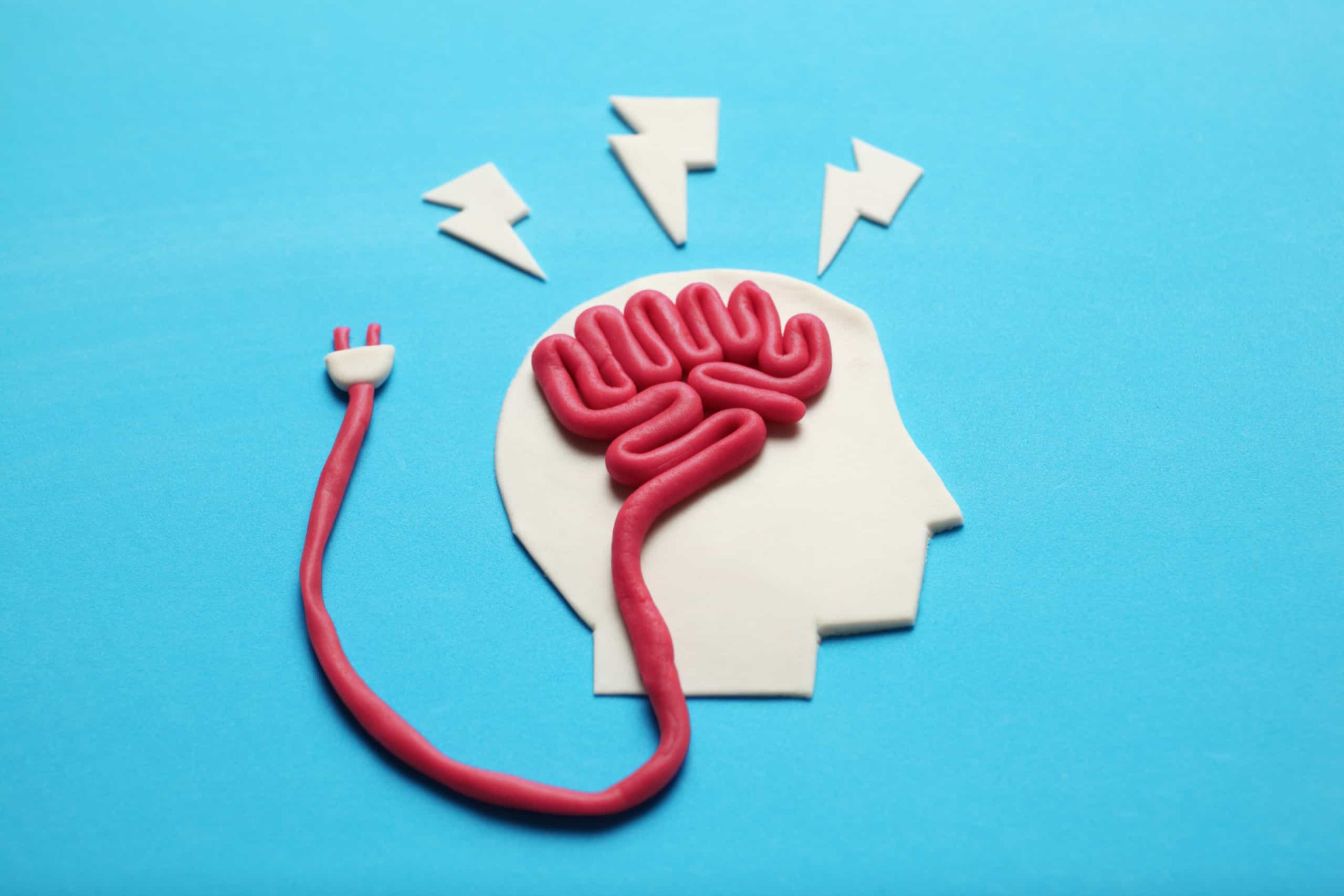
Understand the concept of critical thinking
Before you set about trying to build those critical thinking skills, it is important to first understand what exactly critical thinking is. Put simply, it is the ability to think about ideas and concepts in a critical way.
Follow us and access great exclusive content every day

It is the difference between accepting what you're told at face value and asking questions such as why you're being told that and what is the motivation of the speaker.
You may also like: Scottish landscapes that will take your breath away

Ask questions
It follows, then, that when learning to think critically it is important to ask questions. When you next read a report or listen to a presentation, try and ask as many questions as you can.

Although you run the risk of winding up the presenter, asking questions is in everyone's interest because it can help to expose weaknesses in logic and pave the way for a better solution to a problem.
You may also like: Laugh out loud: The best comedians in history

Question yourself
In addition to asking questions about the information in front of you, it is important also to question your own thoughts and actions on a regular basis.

Questioning yourself will help you identify behaviors that are unhelpful or self-defeating. All too often we continue with a certain behavior because it seems right, when in fact it is making things worse.
You may also like: The (often bizarre) foods historical figures loved

Pay attention to all incoming information
It is paramount that you pay attention to all information coming your way, whether or not it comes from a source or person you agree with.
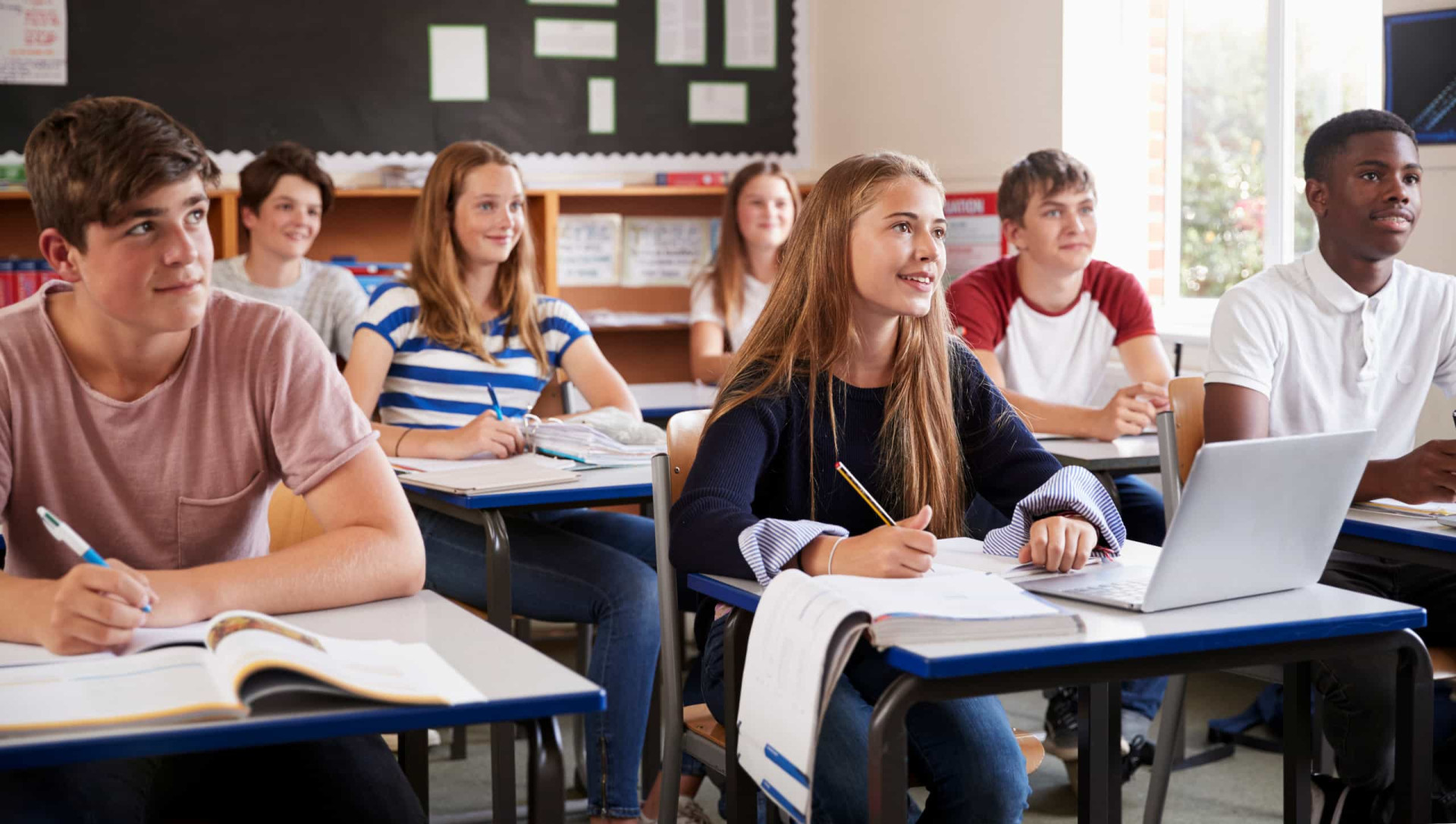
People without critical thinking skills tend to tune out information that they don't want to hear, when in fact people we don't like nearly always have something useful to say.
You may also like: Funny celebrity moments: pranksters on the red carpet

Develop foresight
Good critical thinking always involves an element of foresight. Successful critical thinkers are able to use the information available to them to predict what will happen in the future.

However, foresight is not about clairvoyants and tarot cards. Instead it is about carefully considering all the possible consequences of a certain action.
You may also like: The dark side of Walt Disney

Reduce time-wasting
Critical thinking, like anything else, takes practice. It is therefore a good idea to rid your life of time-wasting activities, such as Netflix bingeing, so you have more time to practice.

That does not mean to say you shouldn't relax, however. In fact, the brain needs downtime in order to develop. Try and go for something more stimulating, though, like reading a book.
You may also like: Hit songs you didn't know were written by Prince

Plan your day
The more you practice critical thinking, the more easily it will come. In the beginning, however, it takes time. It is therefore important to maximize your time by planning carefully.

Prioritize your tasks and don't bite off more than you can chew. Make sure that you are allowing yourself enough time to really focus on each of your projects and consider them critically.
You may also like: Torture tracks: Songs that have been weaponized

Practice critical thinking in your daily life
Do not limit your critical thinking practice to office hours. While being able to think critically is a must if you want to be successful in business, it is also an important life skill in everyday life.

Next time you are choosing a book to read or watching the news, ask yourself what you want to gain from the book, or why that newsreader is emphasizing a particular story.
You may also like: Famous women who were demonized by the media

Keep a thought journal
Try to keep a record of difficult situations that arise and how you handle them. Writing down your thoughts on such situations will help you to reflect better on your own actions.

It may not be easy at first, but laying bare your reactions to a difficult situation will help you to identify and eliminate destructive behaviors and therefore solve problems more efficiently.
You may also like: Celebrities who were raised by single fathers

Check your ego
Having a big head can inhibit critical thinking since it makes it difficult to be objective when assessing a situation. However, being too altruistic doesn't help either.

Try to assign the same level of importance to both your needs and the needs of others. When analyzing a situation, try to focus on people's motivations; why do they want a certain outcome?
You may also like: Funniest sayings from around the world

Practice active listening
Active listening involves truly paying attention while someone else is talking, and not letting your eyes glaze over and your mind run off elsewhere.

Not only is it rude not to listen properly when someone is presenting, but you will miss important information and/or ideas that should be submitted to your own mental analysis.
You may also like: Bandmates who hated each other

Evaluate existing evidence
If you have a business problem to solve, the likelihood is that someone before you has solved a very similar if not identical issue. Make the most of past learnings to help you in the present.

Ask yourself whether you have encountered the issue before and, if not, speak to others. Use all the information available to you to find a successful solution.
You may also like: These celebrities live in surprisingly modest homes

Engage a mentor
Like many other things in life, critical thinking can be taught. If the tips in this gallery aren't enough, it may be an idea to find a mentor who can help you on your way to becoming a critical thinking expert.

A mentor may be able to frame critical thinking in such a way that it becomes more accessible and natural to you, and they may have resources for you to practice with.
You may also like: Bizarre jobs that no longer exist

Participate in team-building activities
Many team-building activities put on by companies have the aim of improving the critical thinking skills of employees.
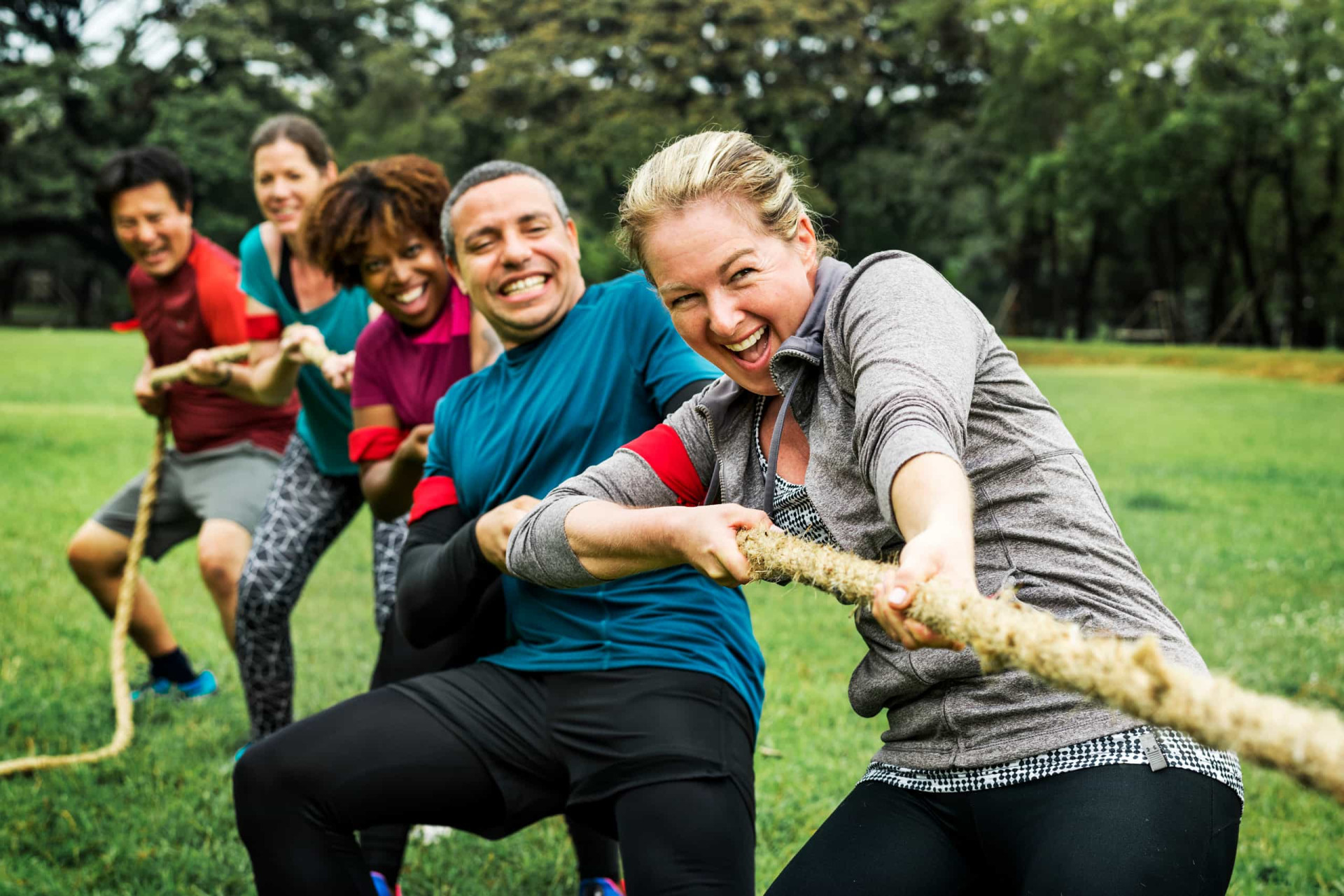
Try not to let the thought of your next team-building session fill you with dread. Instead, see it as an opportunity to hone those critical thinking skills and give you a competitive advantage.
You may also like: Bizarre jobs within the British royal household

Take on a leadership role
If you're feeling confident, why not throw yourself in the deep end and volunteer to lead a project? Leaders are required to constantly think critically, meaning you'll have loads of practice.

And as we all know, practice makes perfect. So next time your boss asks for a volunteer to head a new initiative, why not take the plunge?
Sources: (Indeed) (Small Businessify)
See also: 30 fun virtual team building ideas
More for You
18 Things You Should Never Do At Work, According to HR Experts
Trump's Defense Made 'Textbook Mistakes' During Cross Examination: Attorney
7 Smells That Ants Absolutely Hate
2024 NFL schedule: Ranking eight potential Chiefs opponents for season opener
Watch: NASA simulates what happens when an object enters a black hole
Hit Netflix series watched more than 56 million times in its first month
Five exercises that are better than push-ups for a stronger chest
I Lost 50lbs With 3 Lifestyle Changes
Conservative group FreedomWorks shutting down, citing Trump effect
Television Network Makes Historic Decision Regarding Caitlin Clark's WNBA Games
18 Snacks to Keep Away From Your Dog at All Costs
The Minimum Salary You Need To Buy a Home in 2024 in All 50 States
10 Cars That are Super Cheap to Insure
When is the best time to wake up? The ideal waking time, according to experts
Australian rock legend dies aged 67
Scientists discover 'missing' continent that had been seen for 375 years
Putin's NATO Message Is Landing With Americans
‘NCIS' Tony & Ziva Spinoff Series Gets Official Title
Here's How Much Electricity It Takes to Charge A Tesla
10 Kitchen Items You Should Always Buy at Dollar Tree To Save Money

IMAGES
VIDEO
COMMENTS
It makes you a well-rounded individual, one who has looked at all of their options and possible solutions before making a choice. According to the University of the People in California, having critical thinking skills is important because they are [ 1 ]: Universal. Crucial for the economy. Essential for improving language and presentation skills.
Critical thinking can help you better understand yourself, and in turn, help you avoid any kind of negative or limiting beliefs, and focus more on your strengths. Being able to share your thoughts can increase your quality of life. 4. Form Well-Informed Opinions.
The importance of critical thinking in academics cannot be overstated. It equips students with the skills to discern credible sources from unreliable ones, develop well-informed arguments, and approach problems with a solution-oriented mindset. The Origins and Evolution of Critical Thinking. The idea of critical thinking isn't a new-age concept.
Critical thinking is the ability to effectively analyze information and form a judgment. To think critically, you must be aware of your own biases and assumptions when encountering information, and apply consistent standards when evaluating sources. Critical thinking skills help you to: Identify credible sources. Evaluate and respond to arguments.
Critical Thinking. Critical thinking is a widely accepted educational goal. Its definition is contested, but the competing definitions can be understood as differing conceptions of the same basic concept: careful thinking directed to a goal. Conceptions differ with respect to the scope of such thinking, the type of goal, the criteria and norms ...
It develops students' ability to think critically in an academic context right from the start of their language learning. Critical thinking is at the heart of Unlock, fostering the skills and strategies students need to tackle academic tasks when gathering and evaluating information, organizing and presenting their ideas, and then reflecting ...
Critical thinking is a kind of thinking in which you question, analyse, interpret , evaluate and make a judgement about what you read, hear, say, or write. The term critical comes from the Greek word kritikos meaning "able to judge or discern". Good critical thinking is about making reliable judgements based on reliable information.
No matter what the context is, critical thinking will be involved in your academic life and can take form in many different ways. The benefits of critical thinking in everyday life Building better communication. One of the most important life skills that students learn as early as elementary school is how to give a presentation.
As a college student, you are tasked with engaging and expanding your thinking skills. One of the most important of these skills is critical thinking. Critical thinking is important because it relates to nearly all tasks, situations, topics, careers, environments, challenges, and opportunities. It's a "domain-general" thinking skill—not ...
About the Book. Critical Thinking in Academic Research - 2nd Edition provides examples and easy-to-understand explanations to equip students with the skills to develop research questions, evaluate and choose the right sources, search for information, and understand arguments. This 2nd Edition includes new content based on student feedback as ...
Importance of critical thinking for students 1. Decision-making 2. Problem-solving 3. Communication 4. Analytical skills How can students develop critical thinking skills 1. Never stop asking questions 2. Practice active listening 3. Dive into your creativity 4. Engage in debates and discussions 5.
Critical thinking is a vital skill, yet it's often neglected. In higher education, we know the importance of learning objectives that let us measure learner success. Starting with a clear definition of critical thinking allows us to identify the associated skills that we want to imbue in our students and ourselves. Defining Critical Thinking
Critical thinking is a fundamental skill that allows individuals to analyze, evaluate, and interpret information objectively and rationally. It goes beyond merely accepting information at face value; instead, critical thinkers are equipped to delve deeper, question assumptions, and explore various perspectives before arriving at well-informed ...
Critical thinking capacity does all that and more. 4. It's a multi-faceted practice. Critical thinking is known for encompassing a wide array of disciplines, and cultivating a broad range of cognitive talents. One could indeed say that it's a cross-curricular activity for the mind, and the mind must be exercised just like a muscle to stay ...
expression and development of critical thinking in academic writing. In order to establish a background and a frame of reference for the study, I will review a range of research and theorising about the nature and significance of critical thinking, and the perceived difficulties in implementing it in writing.
The importance of critical thinking. Critical thinking is a core academic skill that teaches undergraduate and postgraduate students to question or reflect on their own knowledge and information presented to them. This skill is essential for students working on assignments and performing research. It's also an invaluable skill in many ...
In a time where deliberately false information is continually introduced into public discourse, and quickly spread through social media shares and likes, it is more important than ever for young people to develop their critical thinking. That skill, says Georgetown professor William T. Gormley, consists of three elements: a capacity to spot ...
In recent decades, approaches to critical thinking have generally taken a practical turn, pivoting away from more abstract accounts - such as emphasizing the logical relations that hold between statements (Ennis, 1964) - and moving toward an emphasis on belief and action.According to the definition that Robert Ennis (2018) has been advocating for the last few decades, critical thinking is ...
Critical thinking is key to successfully expressing your individuality as an independent learner and thinker in an academic context. It is also a valuable life skill. Critical thinking enables you to: Evaluate information, its validity and significance in a particular context. Analyse and interpret evidence and data in response to a line of ...
4 The importance of critical thinking and analysis in academic studies. The aim of critical thinking is to try to maintain an objective position. When you think critically, you weigh up all sides of an argument and evaluate its strengths and weaknesses. ... Critical thinking and analysis are vital aspects of your academic life - when reading ...
A 'graduate attribute'. Universities claim that they impart critical thinking to students as a "graduate attribute". Look at any carefully-prepared institutional list of hoped-for graduate ...
First, keep in mind that critical thinking is simply a "deliberate thought process.". Basically, it means that you are using reason and logic to come to a conclusion about an issue or decision you are tangling with. And clear, sound reasoning is something that will help you every day. To help you make the leap from classroom to real world ...
7. Academic Success: Critical thinking is crucial for understanding complex concepts, evaluating arguments, and weaving together information from various sources. . 8. Personal Growth: It helps in self-reflection, aiding individuals in understanding their beliefs, values, and actions better. . 9.
Here is why it is important to include skills like problem-solving and critical thinking in the curriculum. ... driven and demands a fusion of critical skills, life skills, values, and domain ...
Critical thinking is an essential skill for anyone who wishes to be successful in business. It is what allows us to analyze information properly to find appropriate solutions to problems. But it ...